Table of Contents
Money can be counted in dollars and cents. Wealth is a much more abstract and subjective concept. What is wealth to one man is a burden to another.
What is wealth? This is largely a question of what it is that we value in the world. For some, it is time. For others, companionship. For still others, experience. And then, of course, there is the man who measures his wealth in cold, hard cash. None of these is necessarily more valid than the other. But if we do not know what it is that we actually value we can never have wealth.
Even when we decide what it is that we value, wealth can still become a burden. The famous life story of Howard Hughes provides perhaps the most extreme example of the pitfalls that come with getting everything that you want in life. Further, the phenomenon of big lottery winners encountering personal crisis and ending up quickly broke provides some insight into the problems that money as wealth can provide.
To be truly happy in life we must first know what we value. And we must also realize that acquiring more of something that makes us happy does not necessarily make us happier. The following quotes about wealth—what it is and how it can be dangerous—are worth perusing for anyone with an eye toward the good life.
Quotes About Wealth and the Different Ways to Measure Wealth
Emma Goldman
“I’d rather have roses on my table than diamonds on my neck.”
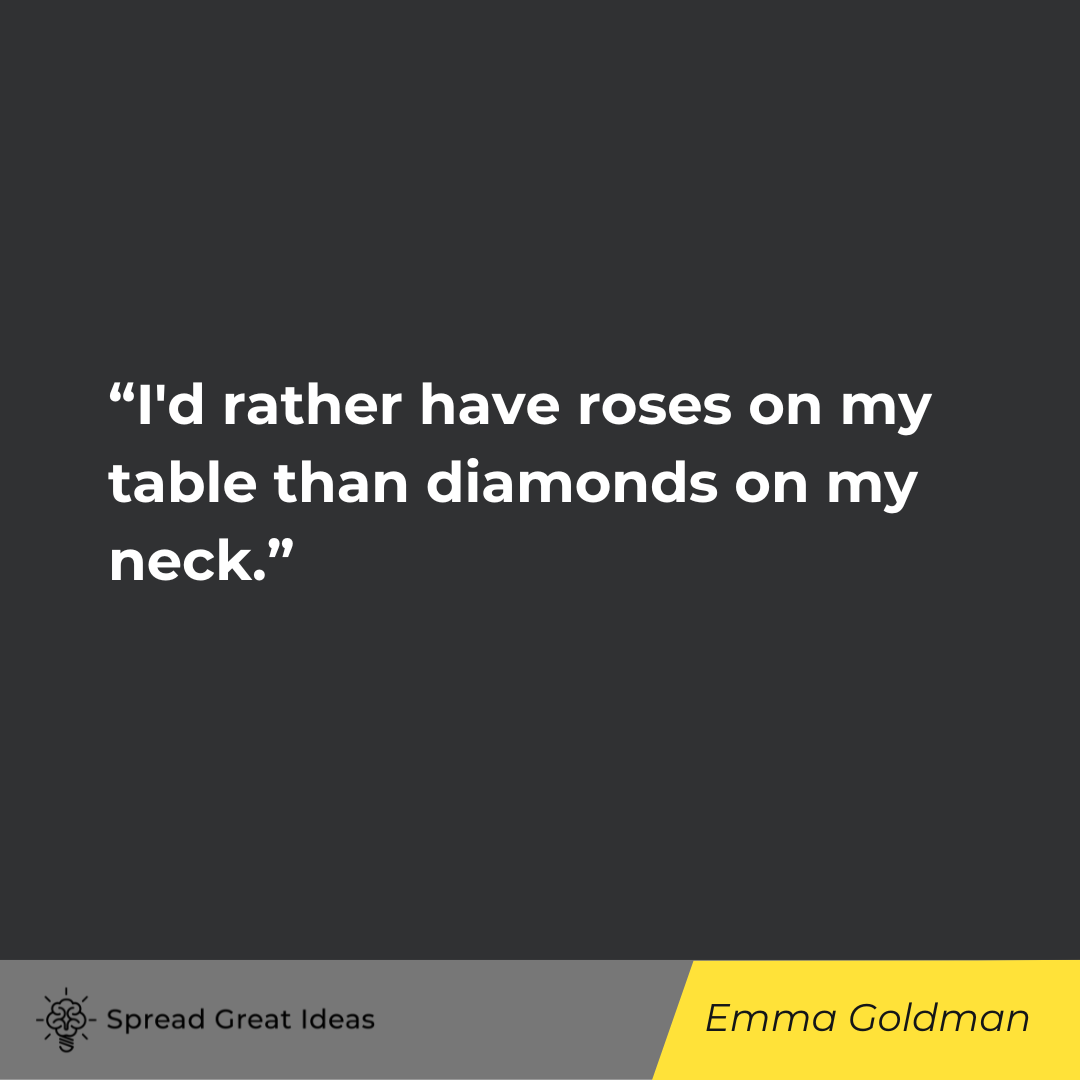
Emma Goldman’s quote embodies a sentiment of prioritizing the simple joys and natural beauty of life over material wealth or extravagance. By expressing a preference for roses, a symbol of nature’s beauty and impermanence, over diamonds, a symbol of luxury and status, Goldman underscores the value of experiences and connections that enrich the human experience. Her words evoke a deeper appreciation for the ephemeral and fleeting moments of beauty that surround us, suggesting that true fulfillment can be found in the simple pleasures of everyday life rather than in the pursuit of material possessions. Overall, the quote encourages a mindset of gratitude and a focus on the meaningful aspects of existence.
Bob Marley
“The greatness of a man is not in how much wealth he acquires, but in his integrity and his ability to affect those around him positively.”
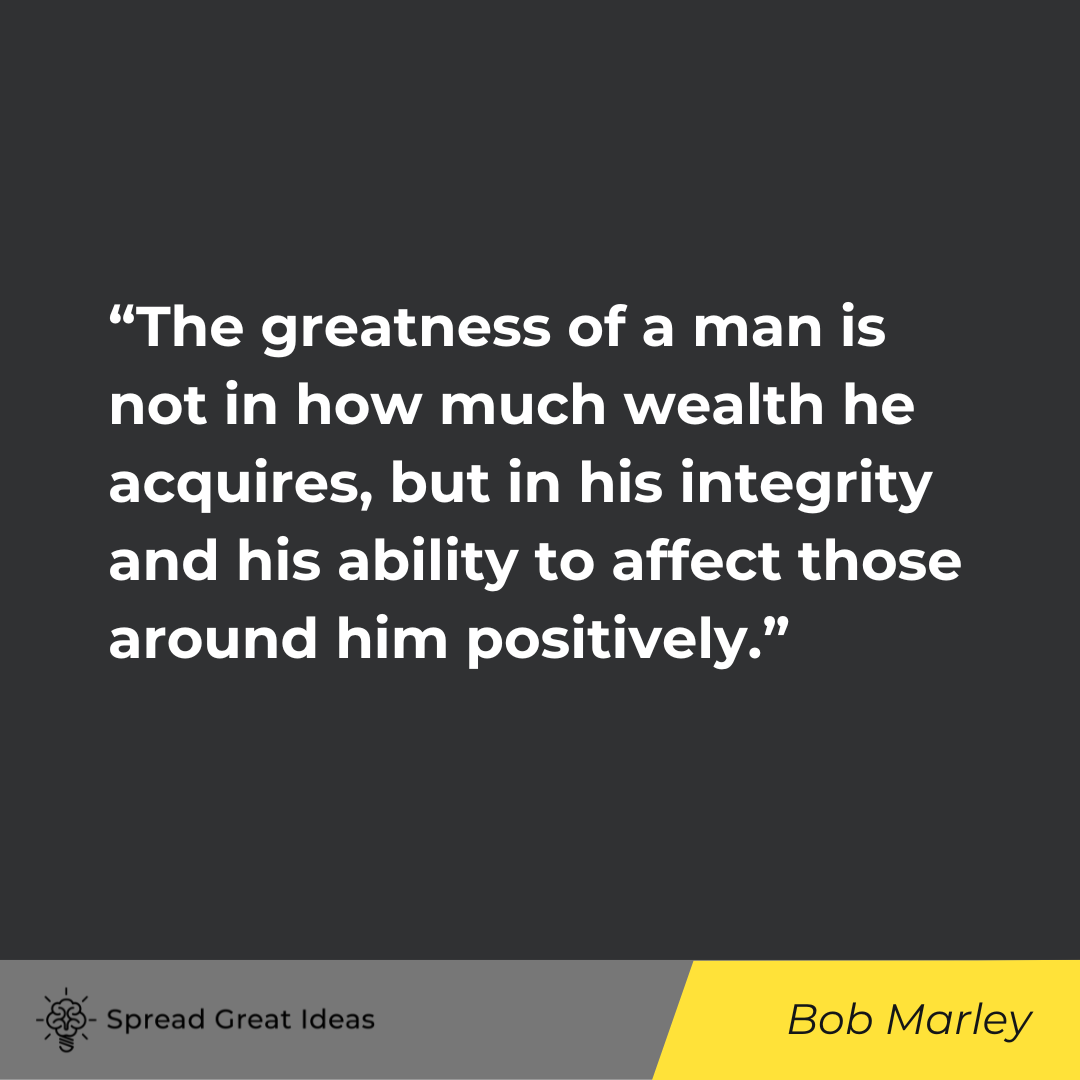
Bob Marley’s quote underscores the idea that true greatness is not measured by material wealth, but rather by one’s character and the positive impact they have on others. By emphasizing integrity and the ability to inspire and uplift those around them, Marley highlights the importance of moral values and compassionate actions in defining a person’s legacy. His words encourage individuals to prioritize virtues such as honesty, empathy, and kindness, recognizing that these qualities hold greater significance than material possessions. Ultimately, the quote serves as a reminder of the profound influence that acts of goodness and integrity can have on shaping a person’s reputation and contributing to the betterment of society.
Jim Rohn
“Time is more valuable than money. You can get more money, but you cannot get more time.”
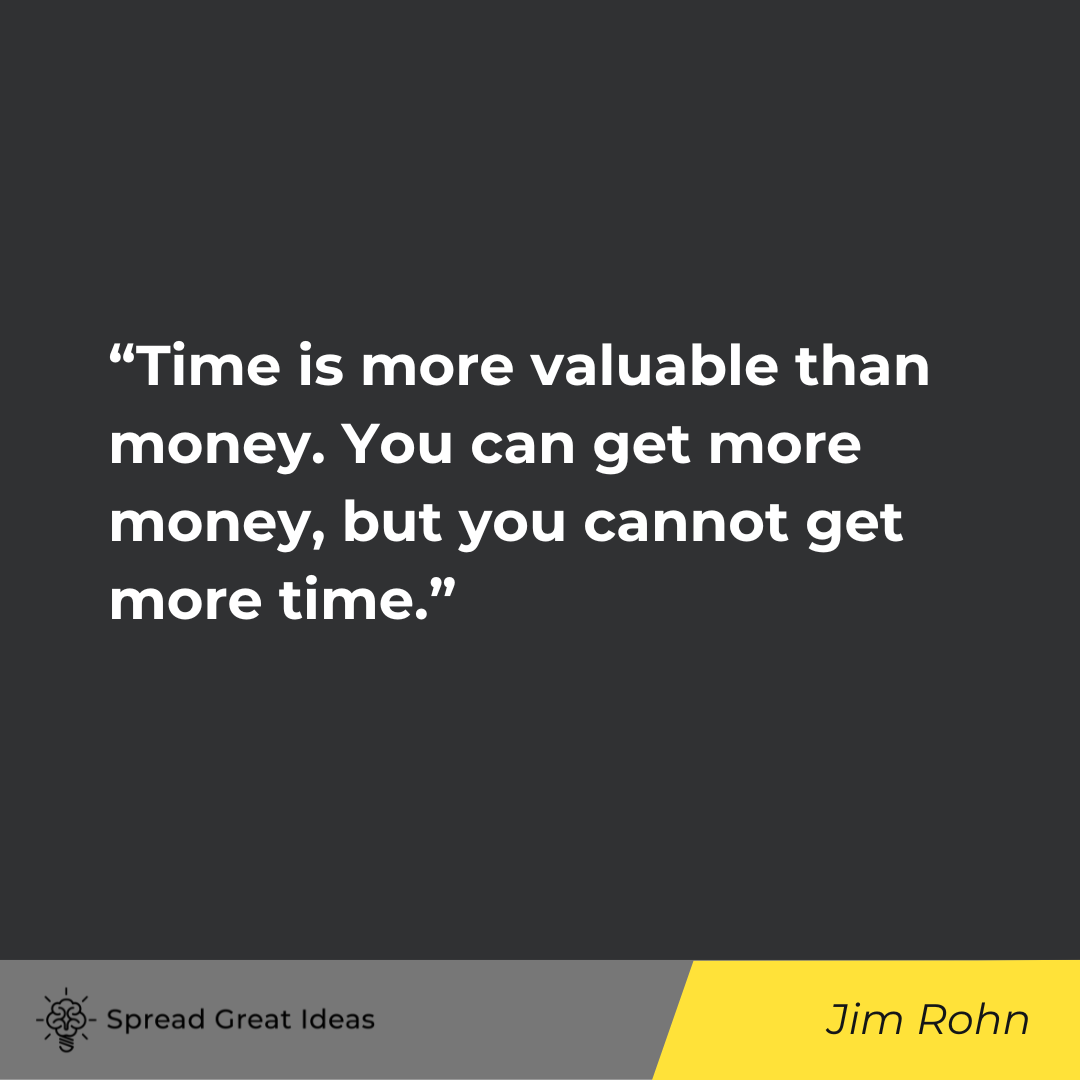
Jim Rohn’s quote emphasizes the intrinsic value of time over material wealth. By highlighting the finite nature of time and its irreplaceable quality, Rohn underscores the importance of prioritizing how time is spent. While money can be earned and accumulated, time is a finite resource that once spent, cannot be reclaimed. The quote serves as a reminder to use time wisely, investing it in pursuits that align with one’s values and goals. It encourages individuals to prioritize experiences, relationships, and personal growth over the pursuit of wealth, recognizing that time is the most precious asset we possess. Overall, the quote prompts reflection on the significance of time management and the choices we make in how we allocate our time.
Seneca
“It is not the man who has too little, but the man who craves more, that is poor.”
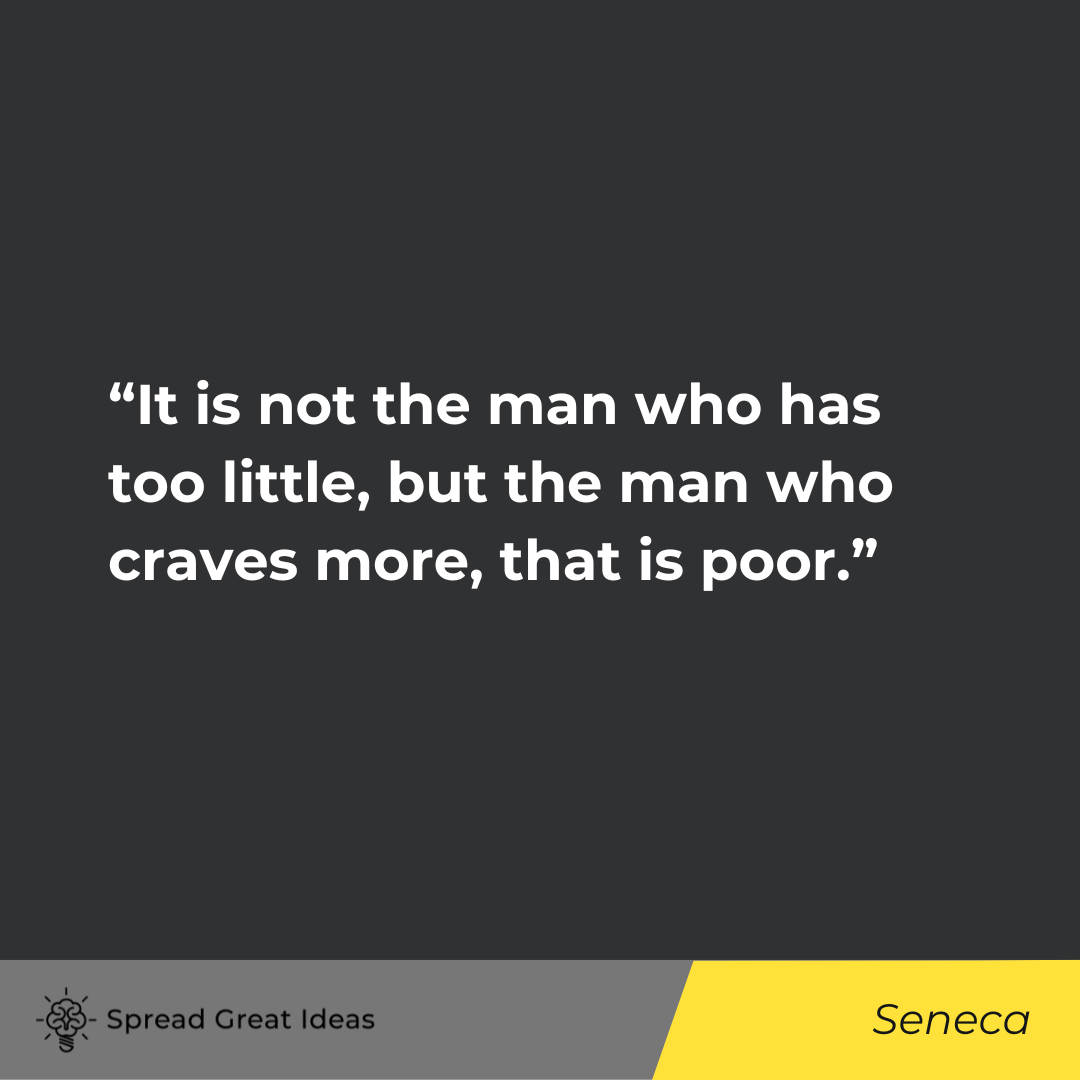
Seneca’s quote delves into the essence of true poverty, highlighting that it is not defined by a lack of possessions or wealth, but rather by an insatiable desire for more. By framing poverty as a state of mind driven by relentless craving, Seneca challenges conventional notions of wealth and poverty. He suggests that contentment and inner richness are not dependent on material abundance, but rather on a mindset of sufficiency and gratitude. The quote encourages individuals to reassess their relationship with material possessions and to recognize that true wealth lies in cultivating a sense of fulfillment and satisfaction with what one already has. Overall, Seneca’s words prompt reflection on the nature of abundance and poverty, urging us to find richness in simplicity and contentment.
Thomas Paine
“What we obtain too cheap, we esteem too lightly: it is dearness only that gives every thing its value. Heaven knows how to put a proper price upon its goods; and it would be strange indeed if so celestial an article as freedom should not be highly rated.”
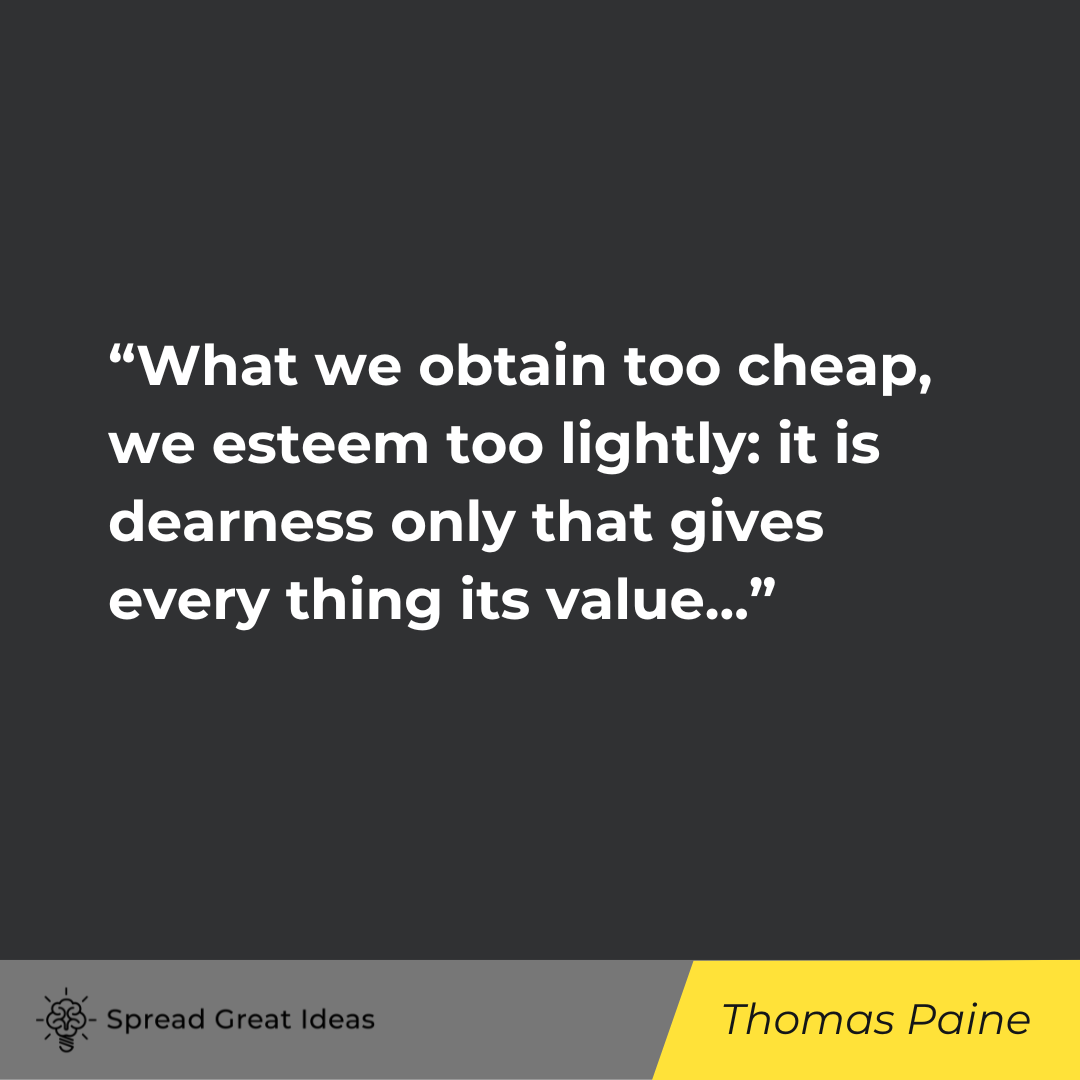
Thomas Paine’s quote reflects on the value of things and the concept of appreciation. He suggests that when something is easily acquired or obtained at little cost, it is often undervalued or taken for granted. Paine uses the example of freedom, emphasizing that its true worth is realized when it comes at a high price or is hard-fought. By likening freedom to a celestial and precious commodity, he emphasizes its inherent value and the importance of cherishing and protecting it. The quote serves as a reminder that the most valuable things in life often require sacrifice, effort, and struggle, and that their significance should not be underestimated.
Epictetus
“Wealth consists not in having great possessions, but in having few wants.”
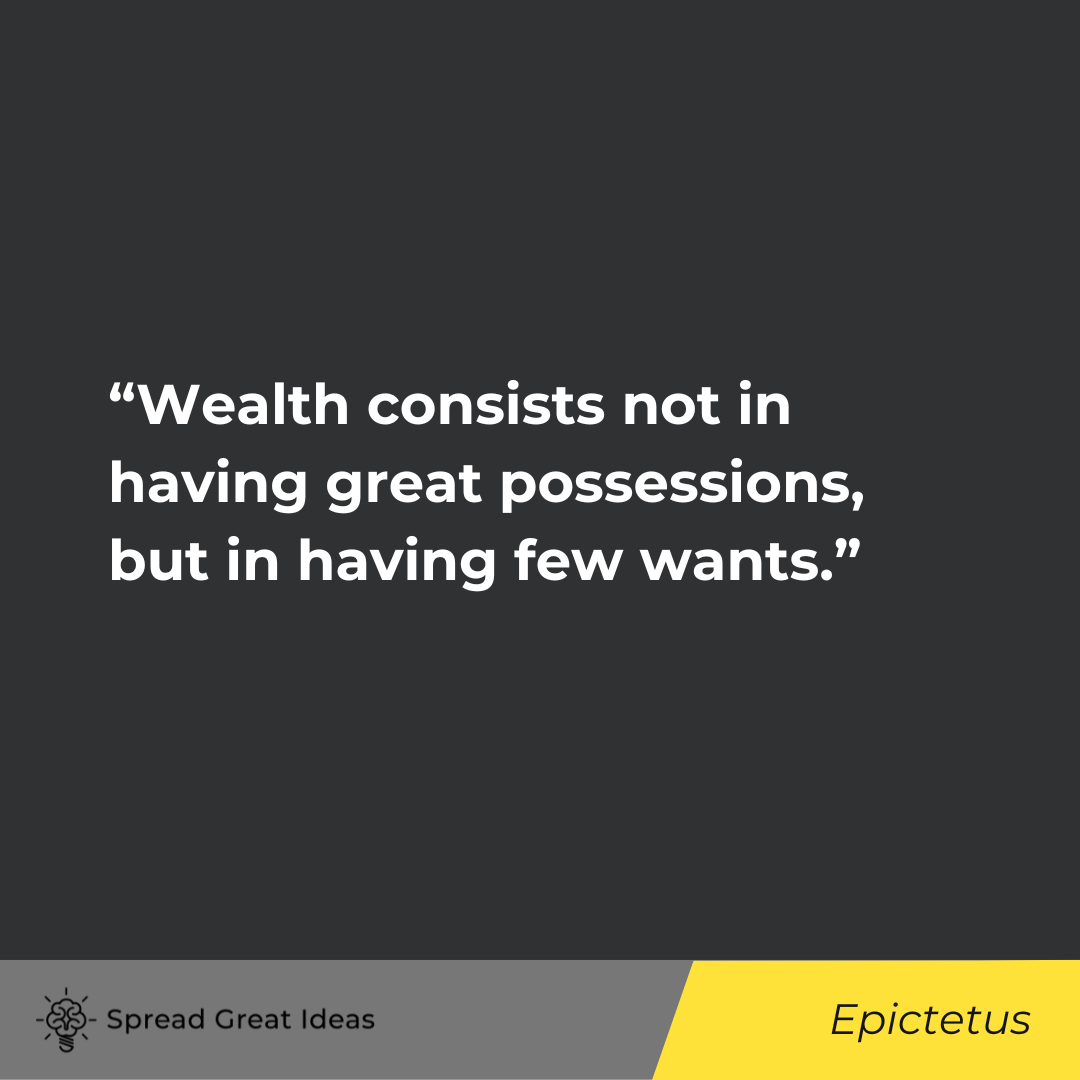
Epictetus’s quote encapsulates the Stoic philosophy of contentment and inner wealth. He suggests that true wealth is not measured by the abundance of possessions one has, but rather by the simplicity of one’s desires. By advocating for a mindset of minimalism and satisfaction with less, Epictetus highlights the idea that freedom from excessive wants leads to a richer and more fulfilling life. The quote encourages individuals to reassess their relationship with material possessions and to find contentment in what they already have, rather than constantly striving for more. Ultimately, Epictetus emphasizes the importance of cultivating a state of mind that values inner peace and tranquility over external wealth and extravagance.
Coco Chanel
“There are people who have money, and people who are rich.”
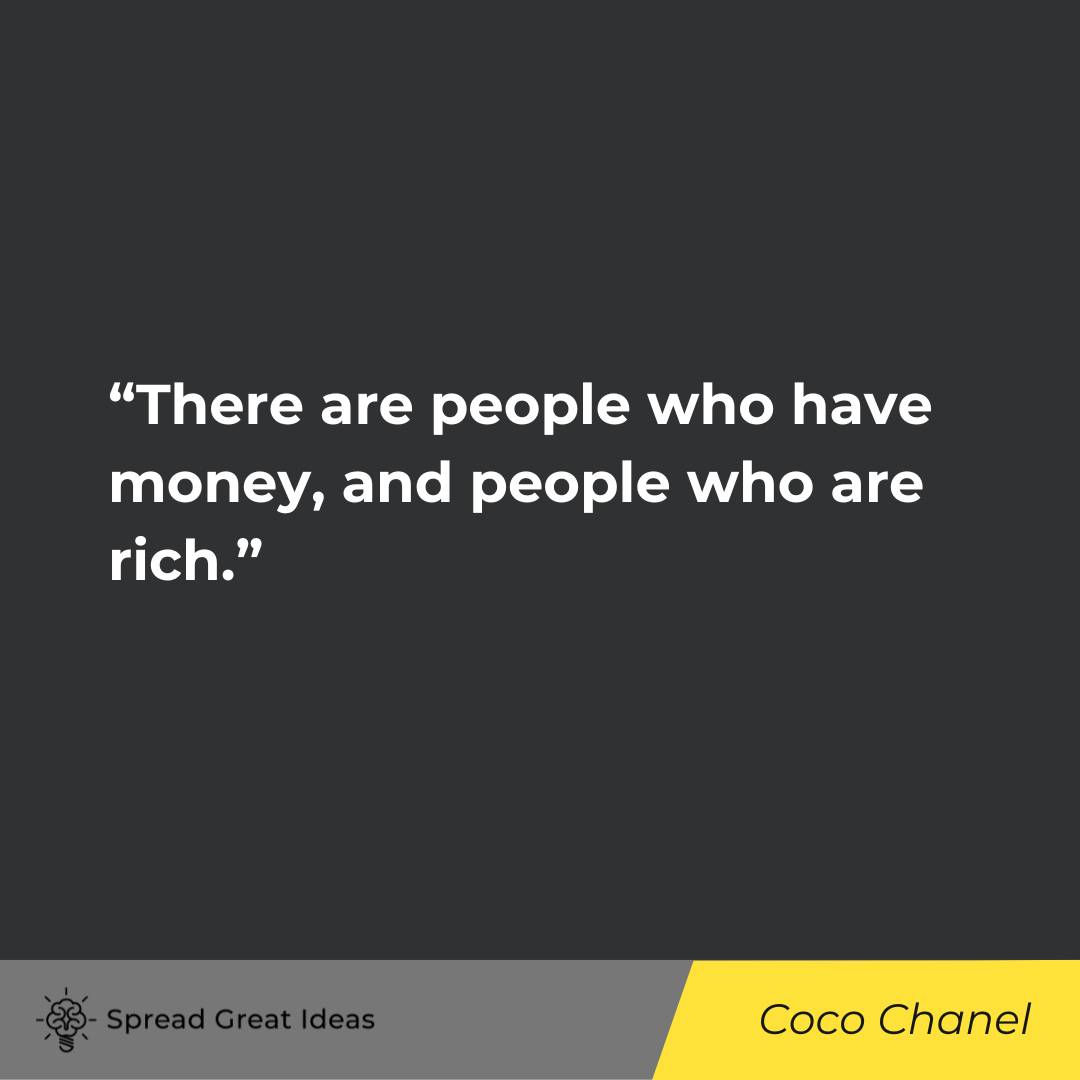
Coco Chanel’s quote captures the distinction between mere financial wealth and true richness in life. She suggests that possessing money does not necessarily equate to being rich in a deeper sense. Instead, true richness encompasses a wealth of experiences, relationships, and personal fulfillment that cannot be measured solely in monetary terms. Chanel’s statement encourages individuals to look beyond material possessions and focus on cultivating a rich and meaningful life through experiences, connections, and personal growth. It prompts reflection on what it truly means to be rich and challenges conventional notions of wealth and success.
Benjamin Franklin
“Money never made a man happy yet, nor will it. There is nothing in its nature to produce happiness. The more a man has, the more he wants. Instead of filling a vacuum, it makes one.”
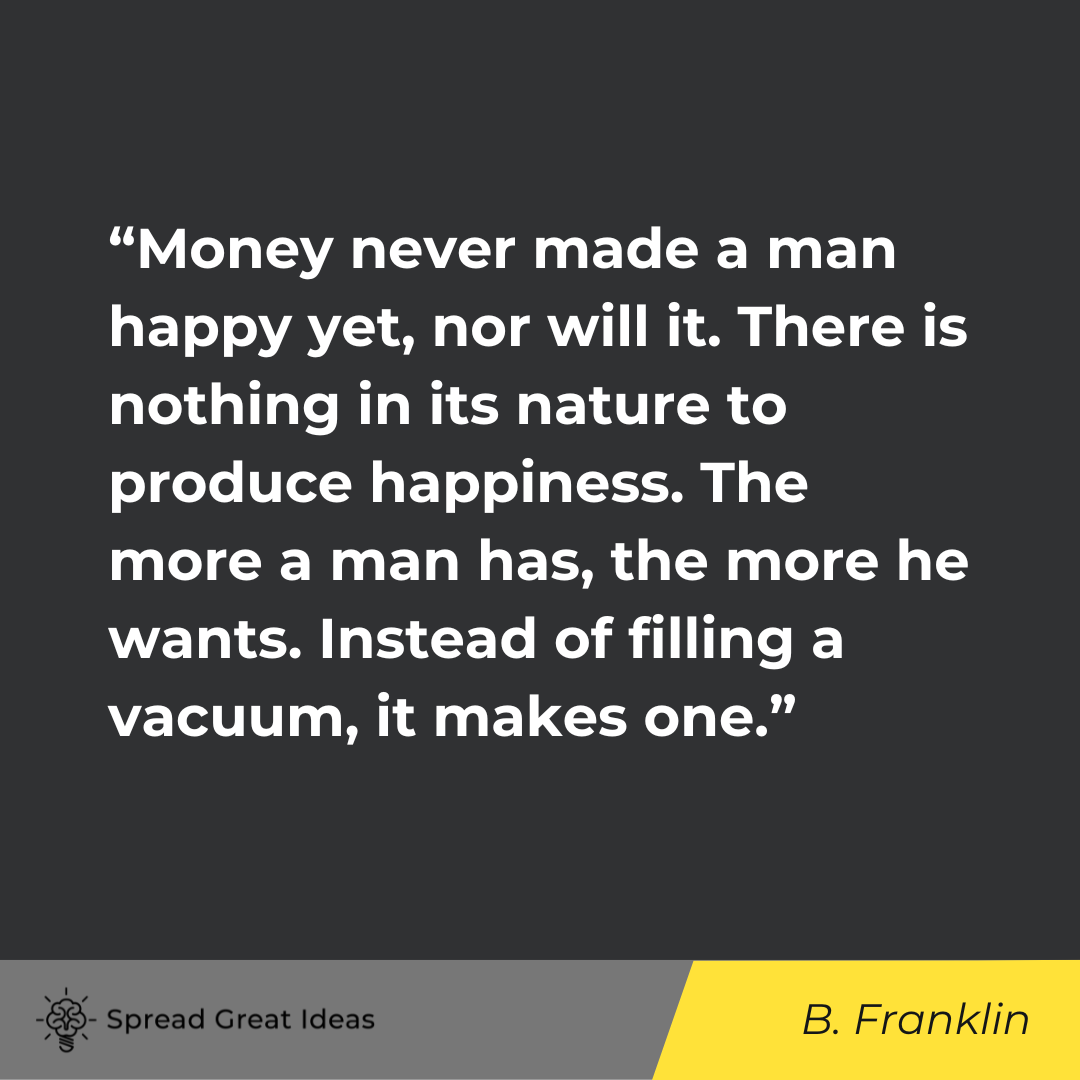
Benjamin Franklin’s quote offers a profound insight into the nature of wealth and happiness. He suggests that money, in itself, does not lead to happiness and may even contribute to a sense of dissatisfaction. Franklin argues that the pursuit of wealth often results in an insatiable desire for more, creating a perpetual cycle of wanting. Rather than fulfilling one’s life, money can exacerbate feelings of emptiness or inadequacy. Through this quote, Franklin challenges the conventional belief that material possessions bring happiness and encourages individuals to seek fulfillment through other means, such as meaningful relationships, personal growth, and experiences that enrich the soul.
Tim O’Reilly
“Money is like gasoline during a road trip. You don’t want to run out of gas on your trip, but you’re not doing a tour of gas stations.”
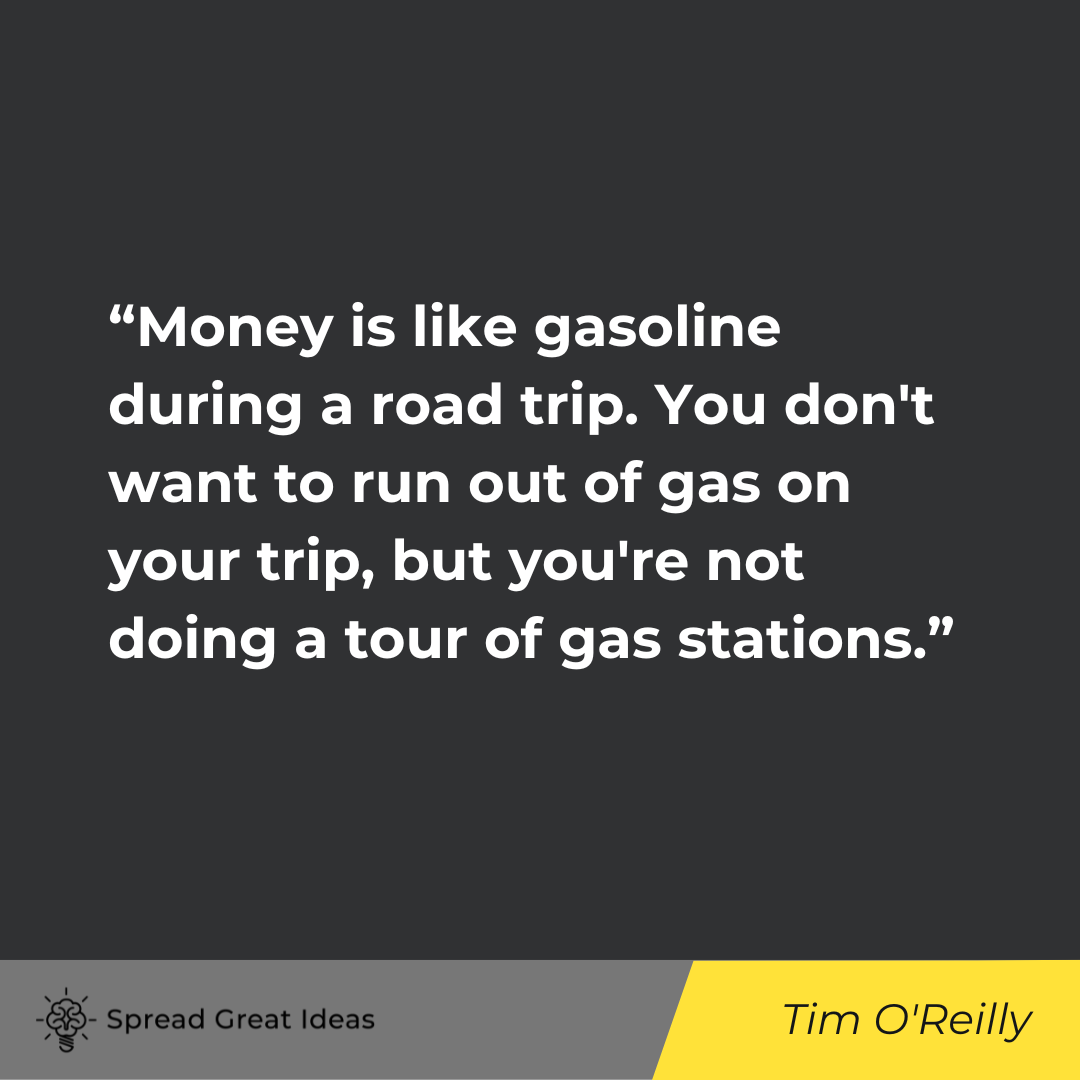
Tim O’Reilly’s quote provides a clever analogy likening money to gasoline during a road trip. He suggests that money is essential for sustaining one’s journey through life, much like gasoline is crucial for a road trip. However, O’Reilly emphasizes that the purpose of the journey is not simply to accumulate money, just as a road trip is not about visiting as many gas stations as possible. Instead, he implies that money should be seen as a means to an end, supporting one’s goals and aspirations, rather than the ultimate destination. The quote encourages individuals to manage their finances wisely, ensuring they have enough to sustain their journey without becoming consumed by the pursuit of wealth for its own sake.
Napoleon Hill
“Remember that your real wealth can be measured not by what you have, but by what you are.”
– Napoleon Hill, Think and Grow Rich
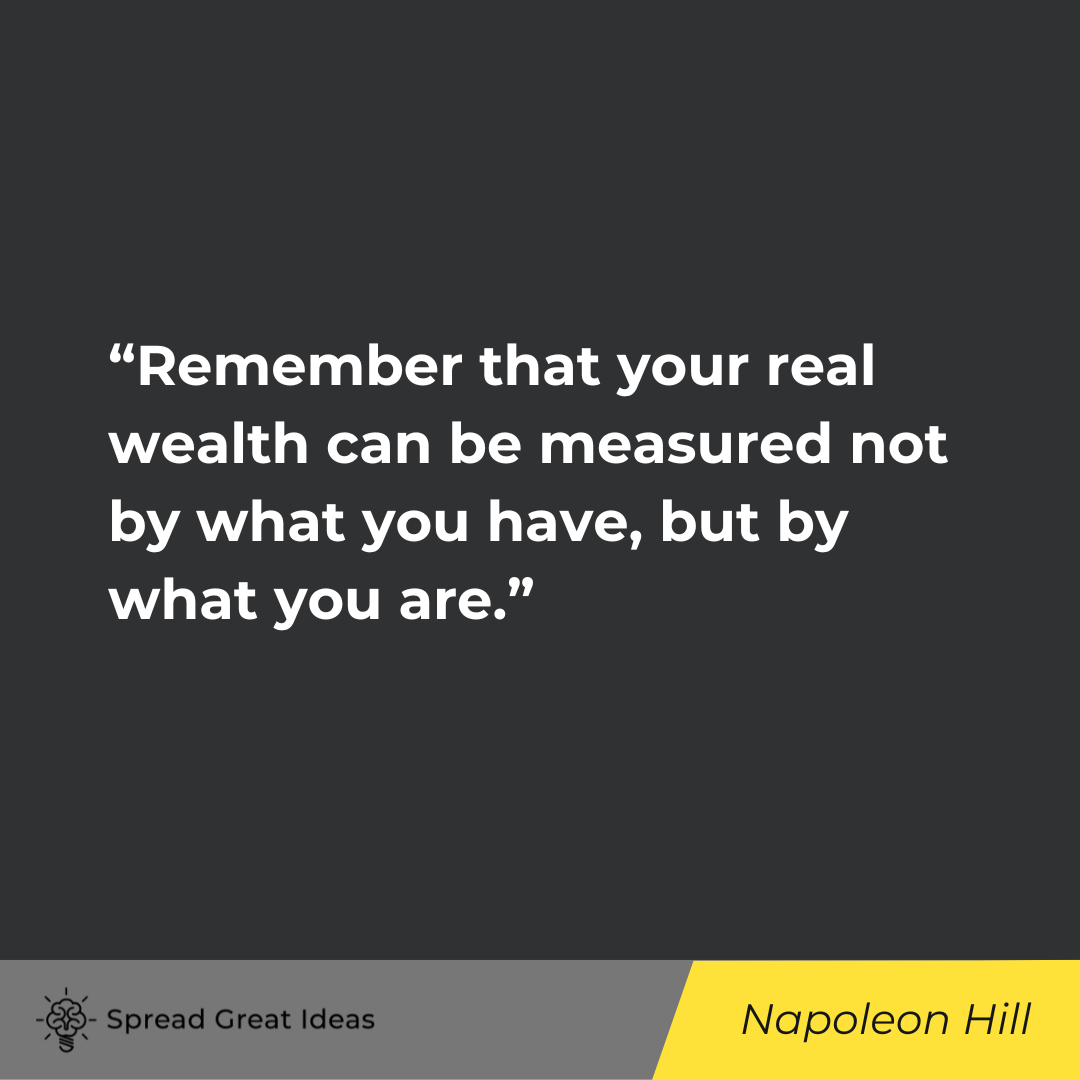
Napoleon Hill’s quote underscores the idea that true wealth is not solely determined by material possessions but rather by one’s personal qualities and character. He suggests that the essence of wealth lies in intangible attributes such as integrity, kindness, knowledge, and personal growth. Hill encourages individuals to recognize that their true worth is defined by who they are as individuals, their virtues, and their contributions to the world, rather than the accumulation of possessions. The quote serves as a reminder to prioritize personal development and inner richness over the pursuit of external wealth.
Karl Lagerfeld
“You know there are many different types of luxury. Luxury also means having the time for yourself without having to live under continual pressure. Today there are some poor people who have nothing to do and others who are far too stressed – so that’s a sort of luxury too. Luxury is also about quality and about a state of mind. You know, you could write an essay on luxury – it’s not just about expensive things. They must be well-made and their price must be justified. Their quality must be impeccable.”
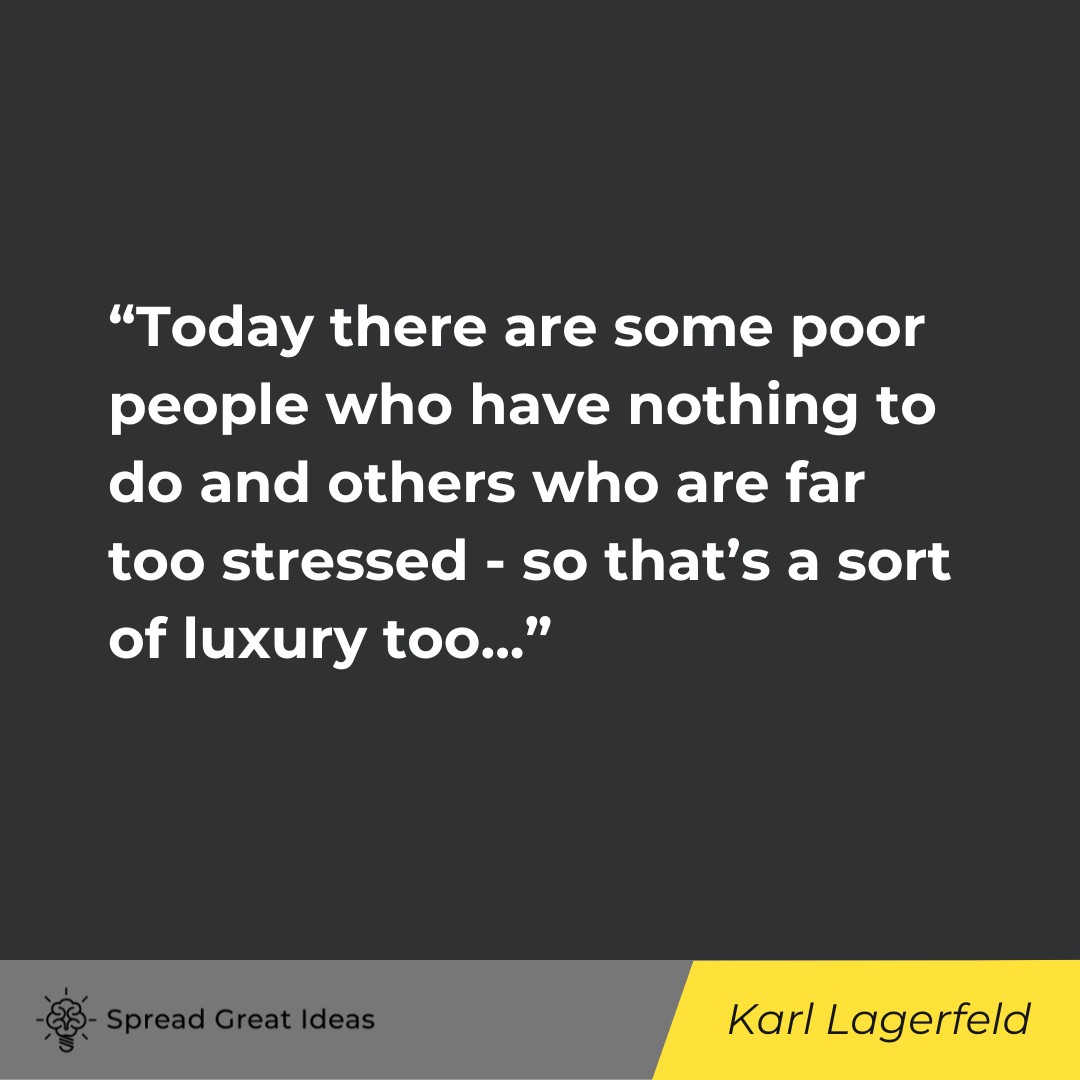
Karl Lagerfeld’s quote offers a nuanced perspective on the concept of luxury, expanding it beyond material possessions. He suggests that luxury encompasses various aspects of life, including having the time for oneself without constant pressure and experiencing a state of mind characterized by quality and contentment. Lagerfeld emphasizes that luxury is not solely defined by expensive items but also by their craftsmanship, quality, and the sense of fulfillment they bring. Through this quote, Lagerfeld invites contemplation on the multifaceted nature of luxury, highlighting its connection to personal well-being and appreciation for excellence in all aspects of life.
Alexandre Dumas
“Those born to wealth, and who have the means of gratifying every wish, know not what is the real happiness of life, just as those who have been tossed on the stormy waters of the ocean on a few frail planks can alone realize the blessings of fair weather.”
– Alexandre Dumas, The Count of Monte Cristo
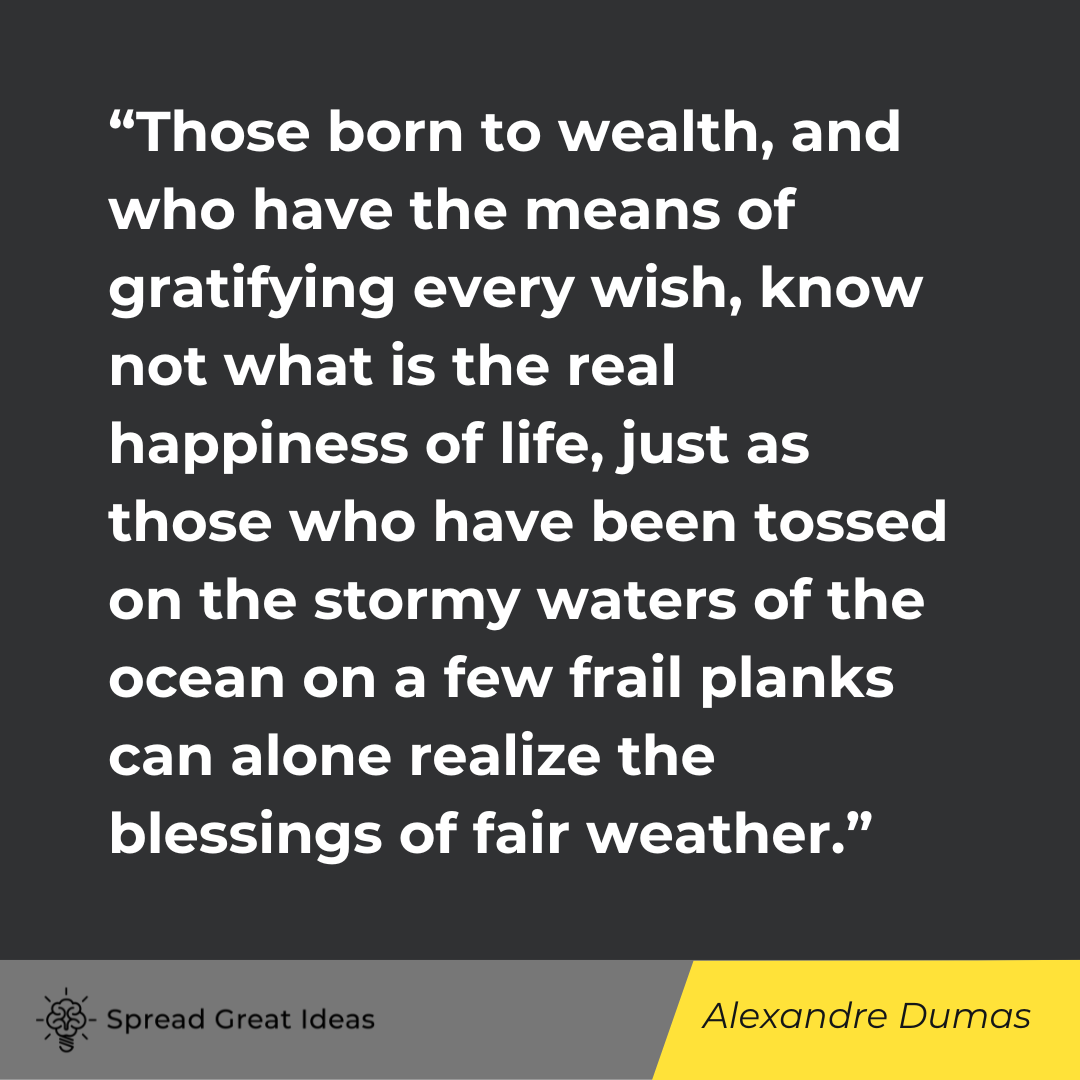
In this quote from “The Count of Monte Cristo,” Alexandre Dumas contrasts the experiences of those born into wealth with those who have faced adversity. He suggests that individuals who have always had their desires fulfilled due to wealth may not truly understand the genuine happiness in life. Instead, it is those who have endured hardships and struggled to survive, represented metaphorically as being tossed on stormy waters, who can appreciate the value of tranquility and contentment during better times. Through this analogy, Dumas underscores the idea that adversity can bring a deeper appreciation for life’s simple joys and blessings.
Ayn Rand
“Money is only a tool. It will take you wherever you wish, but it will not replace you as the driver.”
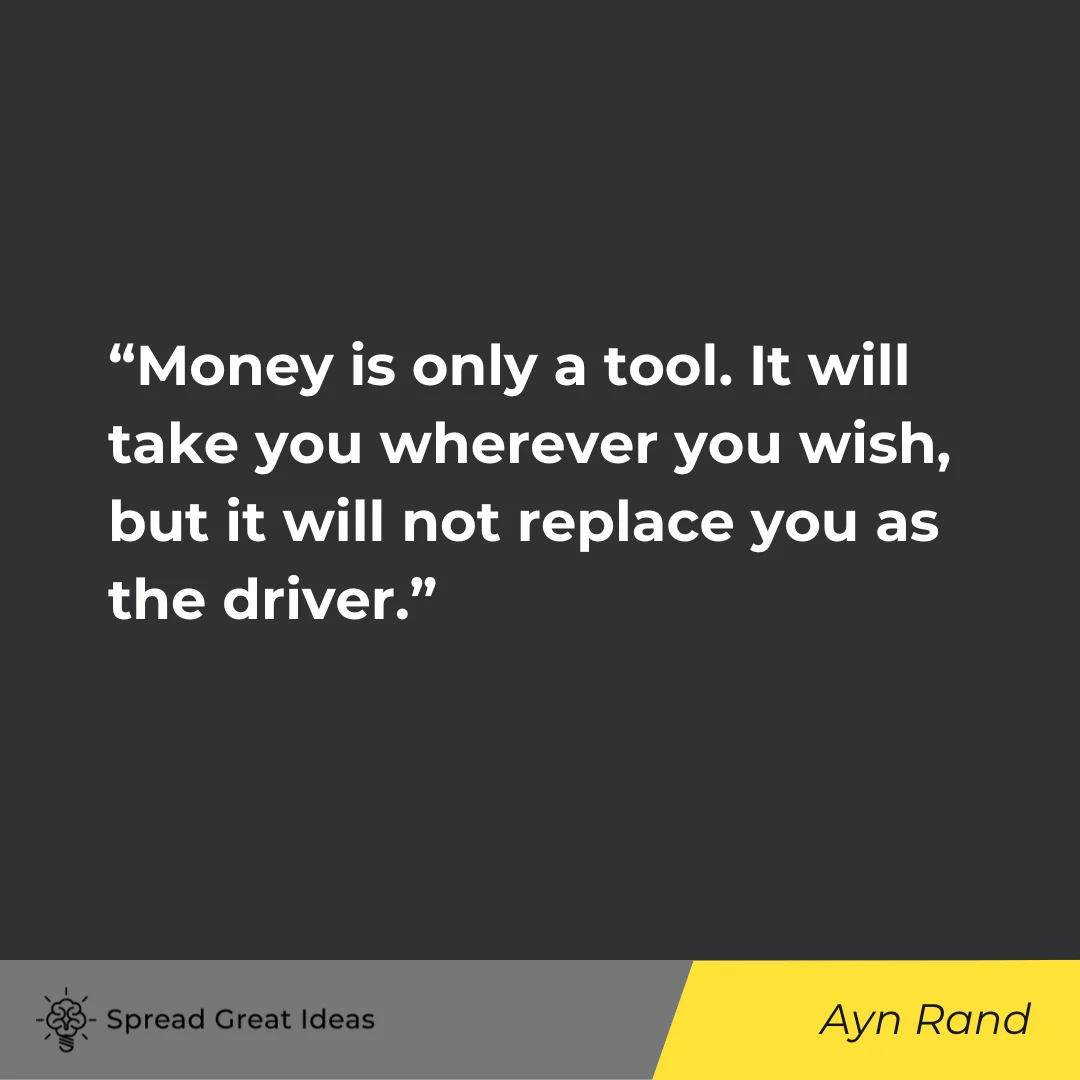
In this quote, Ayn Rand emphasizes the instrumental nature of money. She likens money to a tool that can facilitate one’s desires and aspirations, enabling individuals to achieve their goals and ambitions. However, Rand underscores that money itself does not possess agency or autonomy; it is merely a means to an end. Ultimately, the control and direction of one’s life remain in the hands of the individual, emphasizing personal agency and responsibility.
Henry David
“That man is richest whose pleasures are cheapest.”
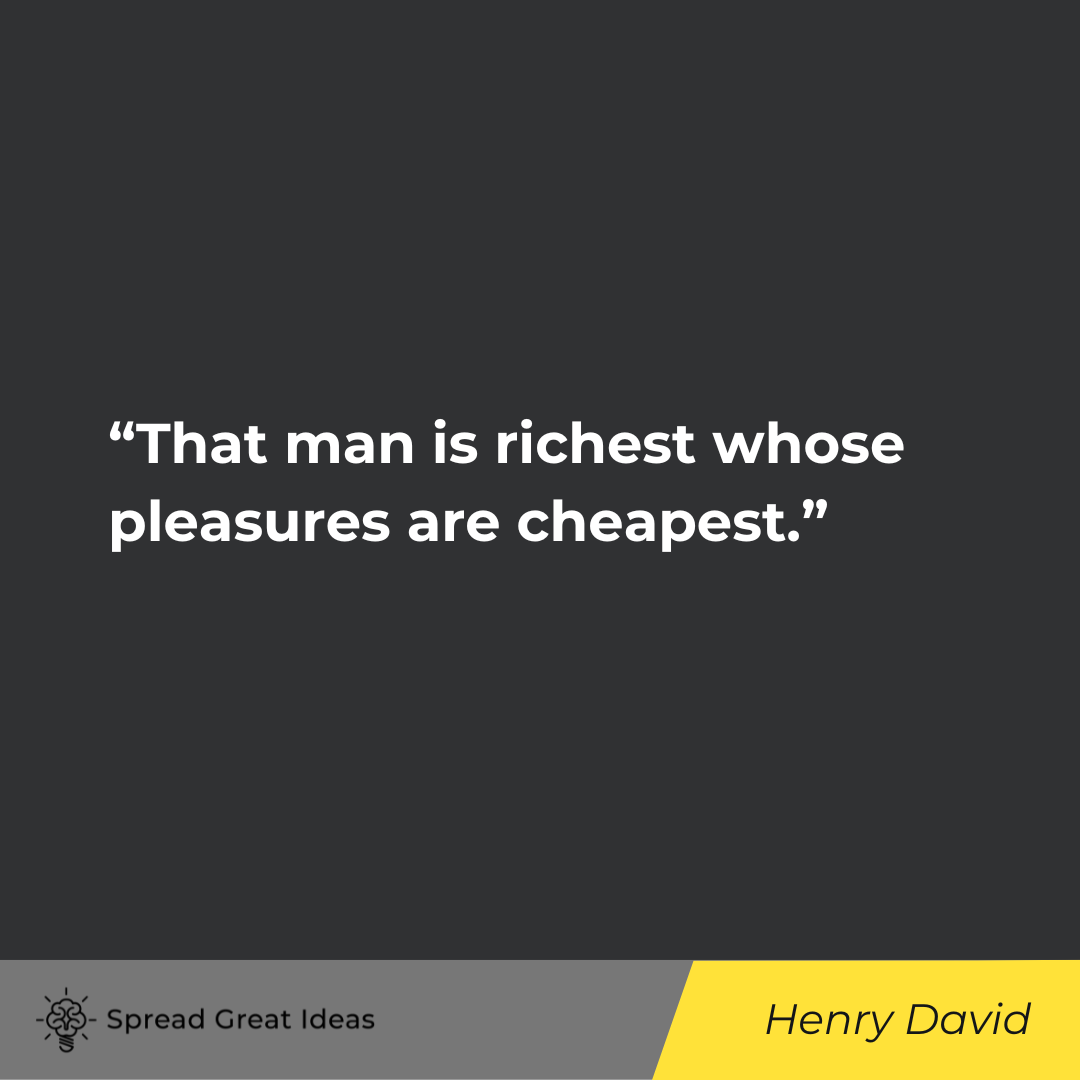
In this quote, Henry David Thoreau suggests that true wealth lies not in material possessions or extravagant indulgences, but in simple and inexpensive pleasures. Thoreau advocates for a minimalist lifestyle focused on experiences that are readily available and do not require significant financial resources. He implies that contentment and richness of life can be found in appreciation of nature, meaningful relationships, and the enjoyment of life’s simple joys, rather than in the accumulation of wealth or material goods.
Henry David
“Books are the treasured wealth of the world and the fit inheritance of generations and nations. Books, the oldest and the best, stand naturally and rightfully on the shelves of every cottage. They have no cause of their own to plead, but while they enlighten and sustain the reader his common sense will not refuse them. Their authors are a natural and irresistible aristocracy in every society, and, more than kings or emperors, exert an influence on mankind.”
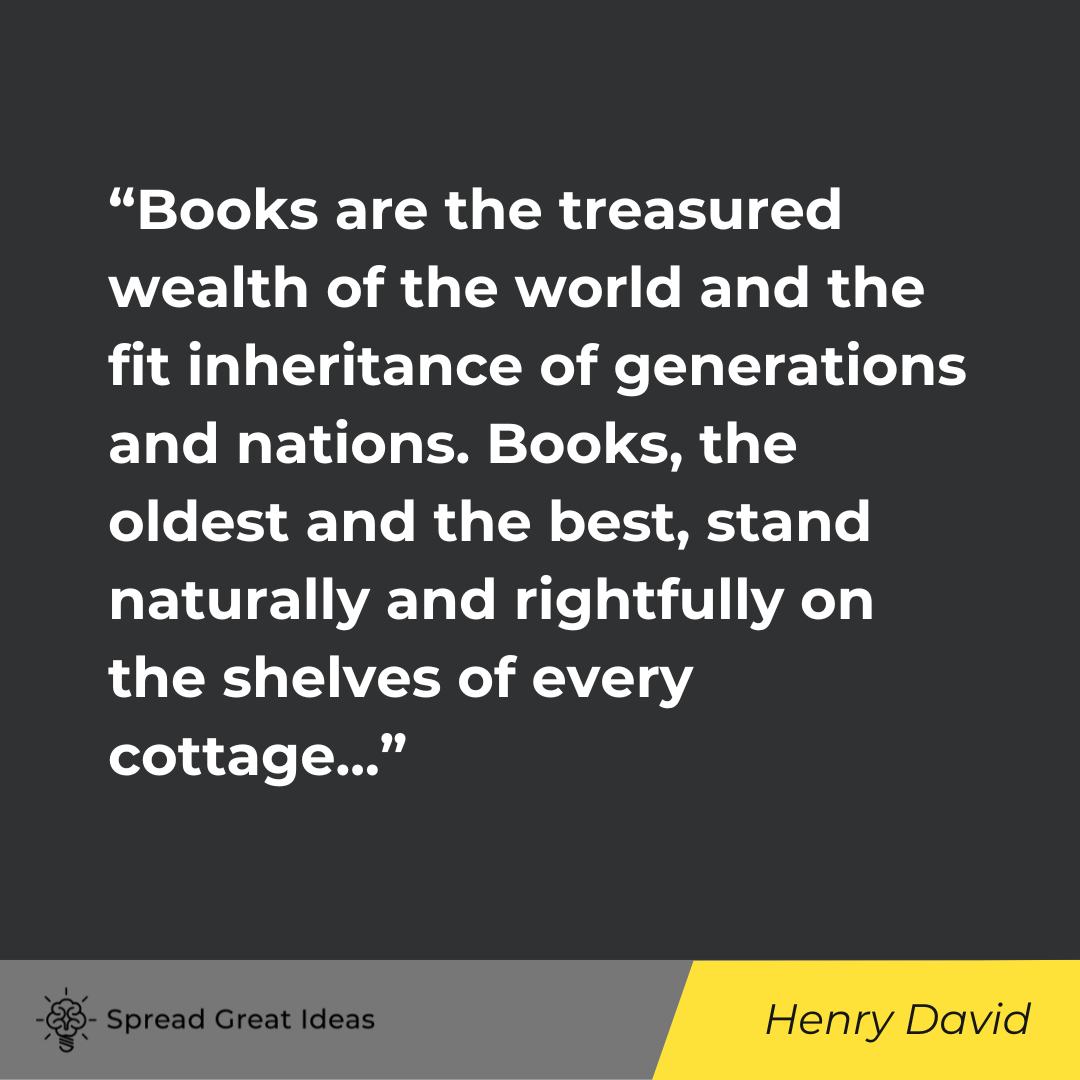
In this quote from “Walden,” Henry David Thoreau extols the invaluable role of books as a universal and timeless repository of knowledge. He asserts that books are not only a source of enlightenment but also a rightful inheritance for all people, transcending social and cultural boundaries. Thoreau emphasizes the profound influence of authors, portraying them as an aristocracy whose wisdom shapes the course of human thought and action. Through his words, Thoreau underscores the enduring significance of literature in enriching the lives of individuals and societies.
P.T. Barnum
“Money is good for nothing unless you know the value of it by experience.”
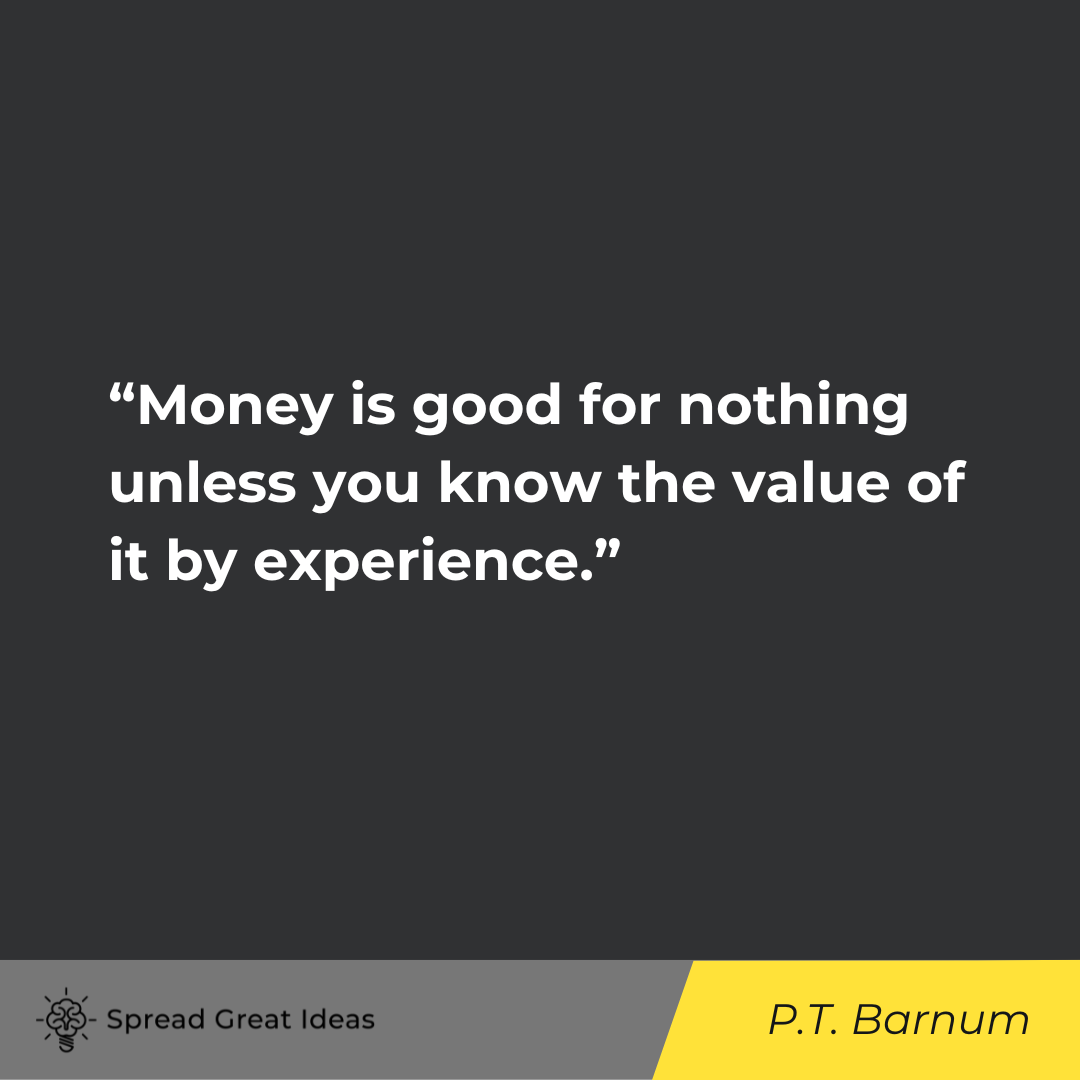
In this quote, P.T. Barnum, known for his success as an American showman and businessman, highlights the importance of personal experience in understanding the true worth of money. He suggests that merely possessing wealth is meaningless unless one has firsthand knowledge of its value through practical encounters with financial matters. Barnum’s perspective underscores the notion that true appreciation for money arises from lived experiences rather than mere possession.
Elbert Hubbard
“I would rather be able to appreciate things I cannot have than to have things I am not able to appreciate.”
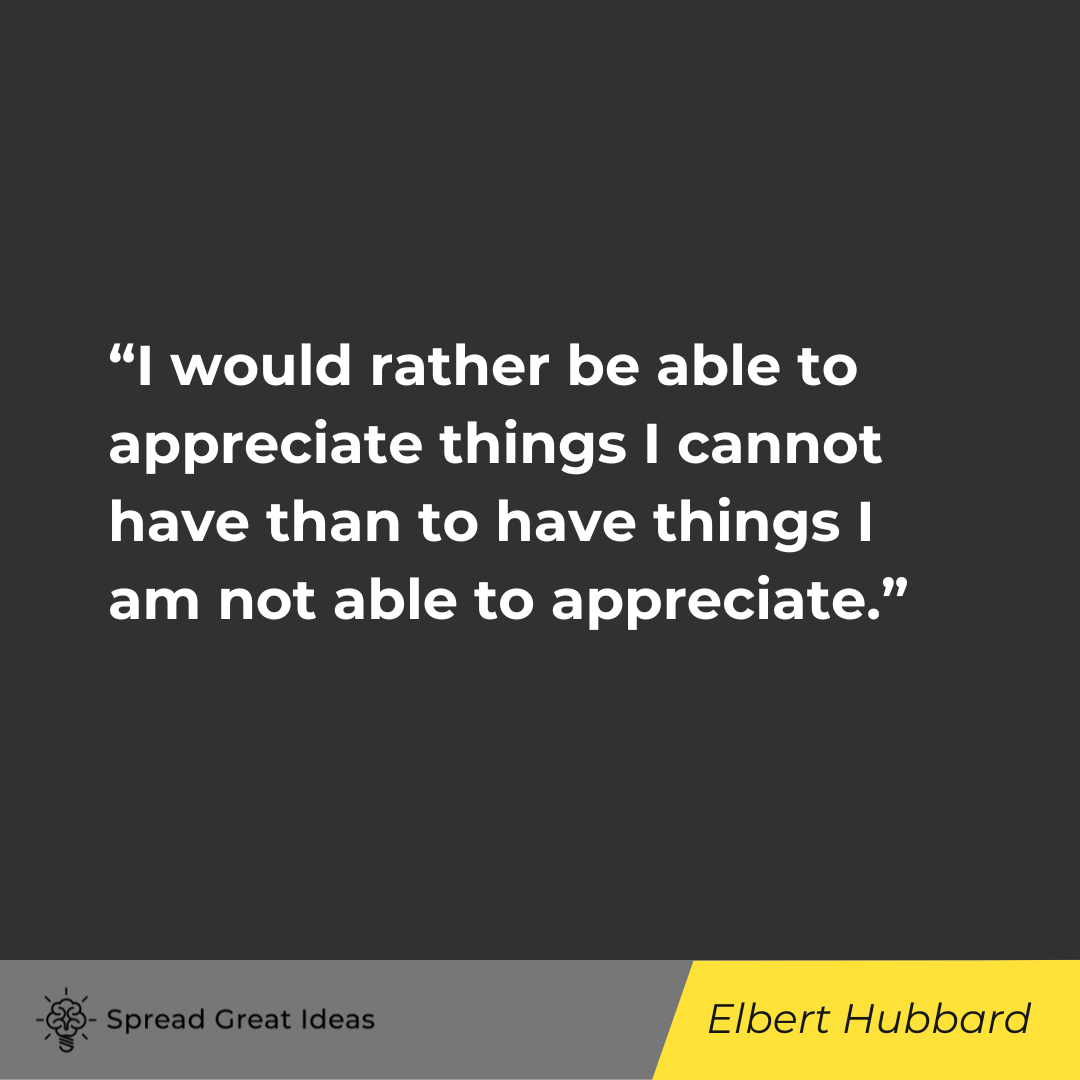
In this quote, Elbert Hubbard, an American writer, philosopher, and artist, expresses the value of appreciation over acquisition. He suggests that it’s preferable to possess the ability to appreciate things beyond one’s reach than to own things that one cannot truly value or appreciate. Hubbard emphasizes the importance of cultivating a mindset of gratitude and contentment, implying that true wealth lies in the capacity to find joy in the intangible aspects of life rather than material possessions.
Sigmund Freud
“It is impossible to escape the impression that people commonly use false standards of measurement — that they seek power, success and wealth for themselves and admire them in others, and that they underestimate what is of true value in life.”
– Sigmund Freud, Civilization and Its Discontents
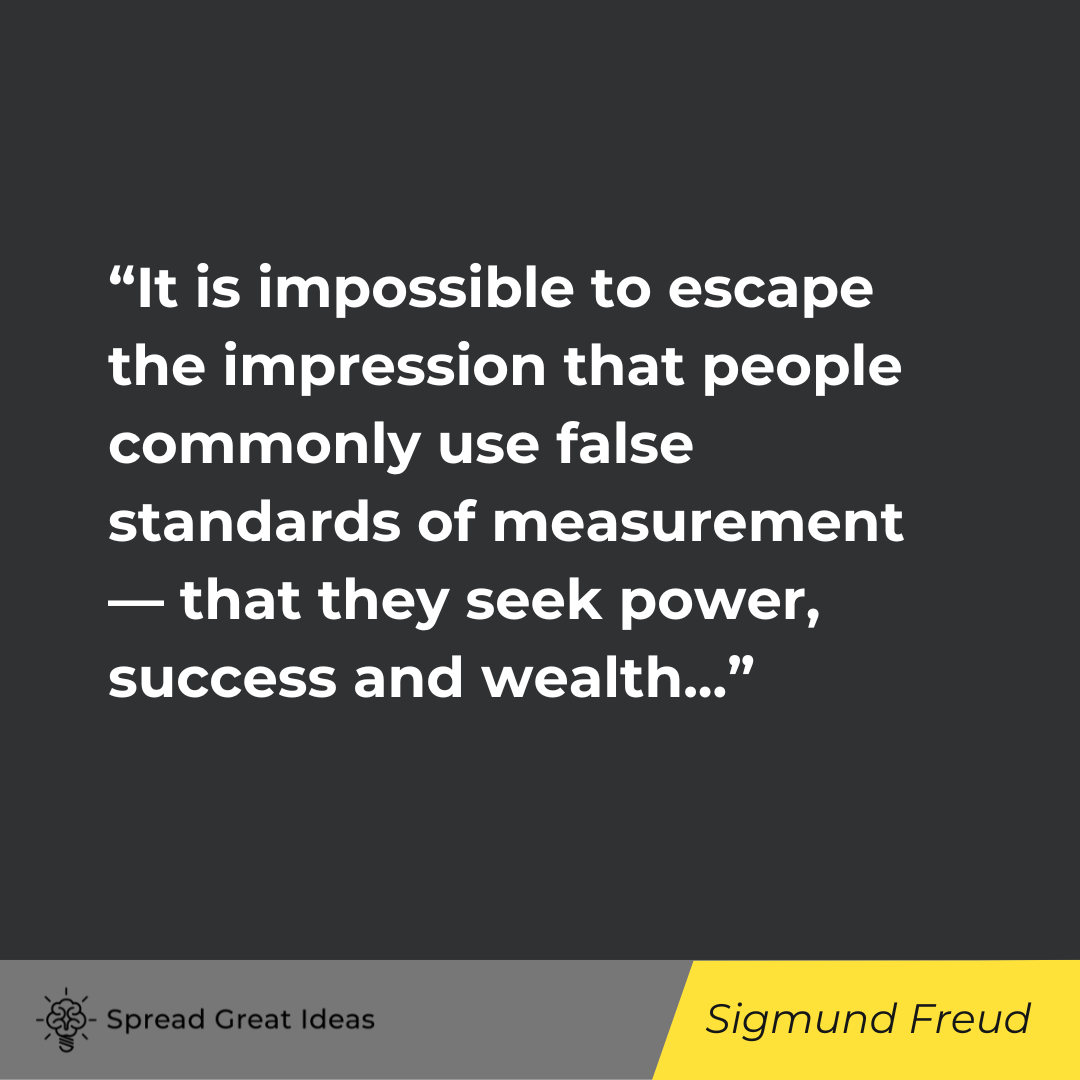
In this quote from “Civilization and Its Discontents,” Sigmund Freud, the renowned psychologist, reflects on the flawed values prevalent in society. He suggests that people often prioritize external markers of success such as power, wealth, and status, while undervaluing intrinsic qualities and meaningful experiences. Freud implies that this skewed perspective leads to dissatisfaction and a lack of fulfillment, highlighting the need for a reassessment of what truly matters in life.
Quotes About the Dangers of Wealth and How Too Much Can Be Bad
Arthur Schopenhauer
“Wealth is like sea-water; the more we drink, the thirstier we become; and the same is true of fame.”
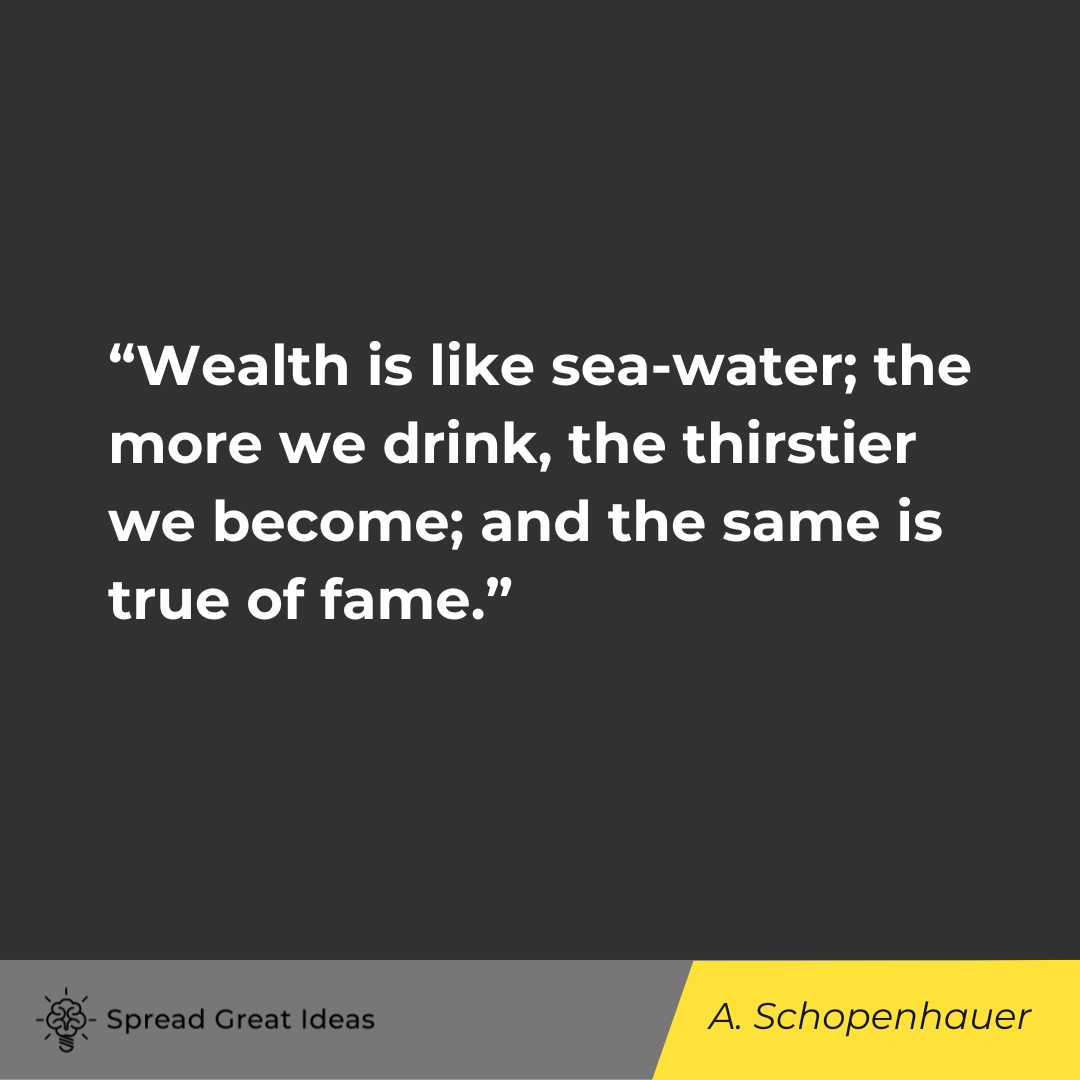
Arthur Schopenhauer, the German philosopher, draws a striking analogy between wealth and fame, likening them to seawater. He suggests that the pursuit of wealth and fame is insatiable, much like drinking seawater which only increases one’s thirst. This quote underscores the idea that the quest for material wealth or public recognition often leads to perpetual desire rather than satisfaction, emphasizing the futility of these pursuits in achieving lasting contentment.
Alain de Botton
“The wealthier you are, the more expectations you tend to have. And it’s when expectations are dashed that fury breaks out. The rich believe that their money will insulate them from setbacks and frustrations, and that’s one of the absurdist expectations of all.”
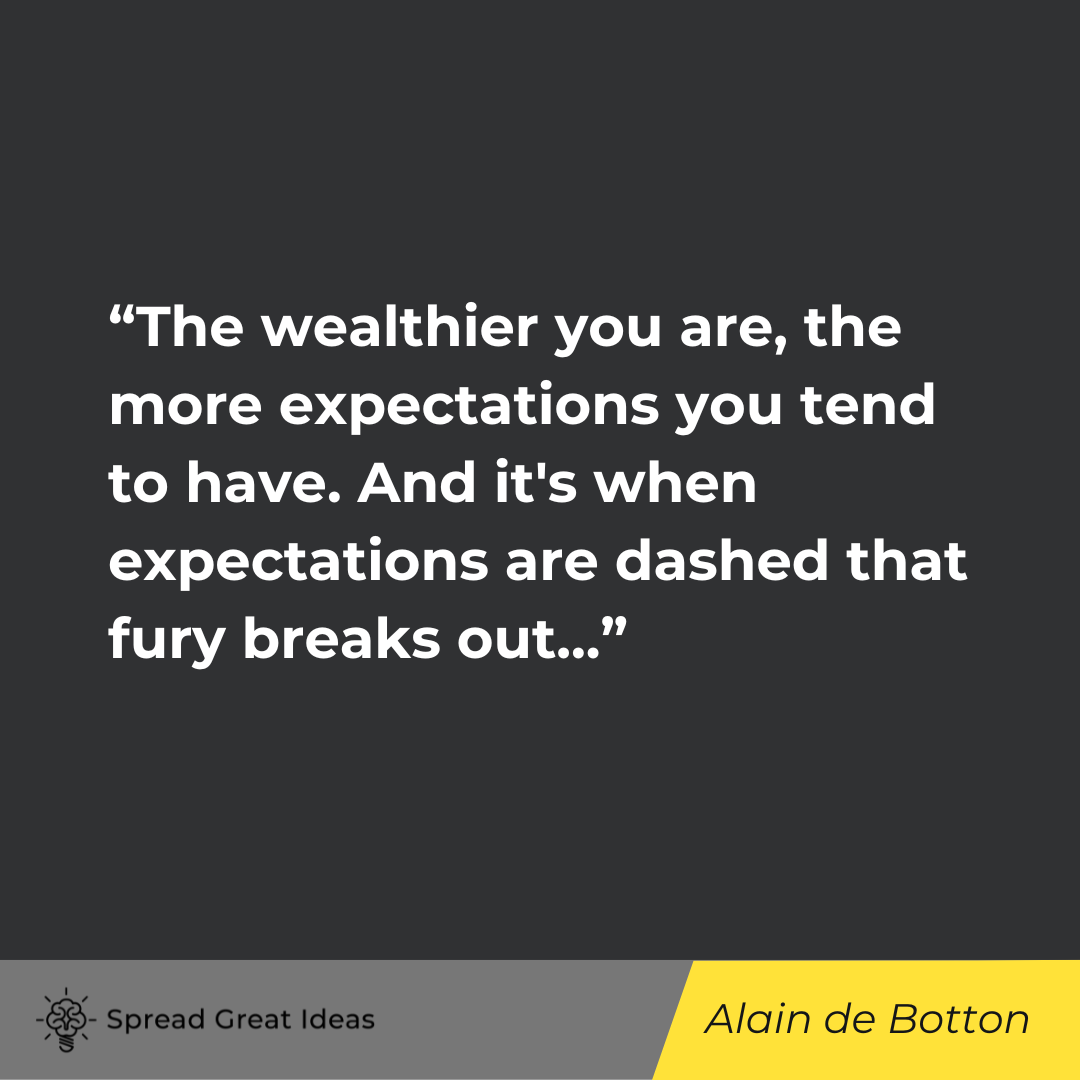
In this quote, philosopher Alain de Botton highlights a paradox of wealth: the more affluent one becomes, the higher their expectations often soar. However, when these expectations inevitably go unmet, it can lead to profound disappointment and even anger. De Botton suggests that the rich often harbor the unrealistic belief that their financial status will shield them from life’s setbacks, which he sees as a fundamentally flawed and unrealistic expectation.
Coco Chanel
“Some people think luxury is the opposite of poverty. It is not. It is the opposite of vulgarity.”
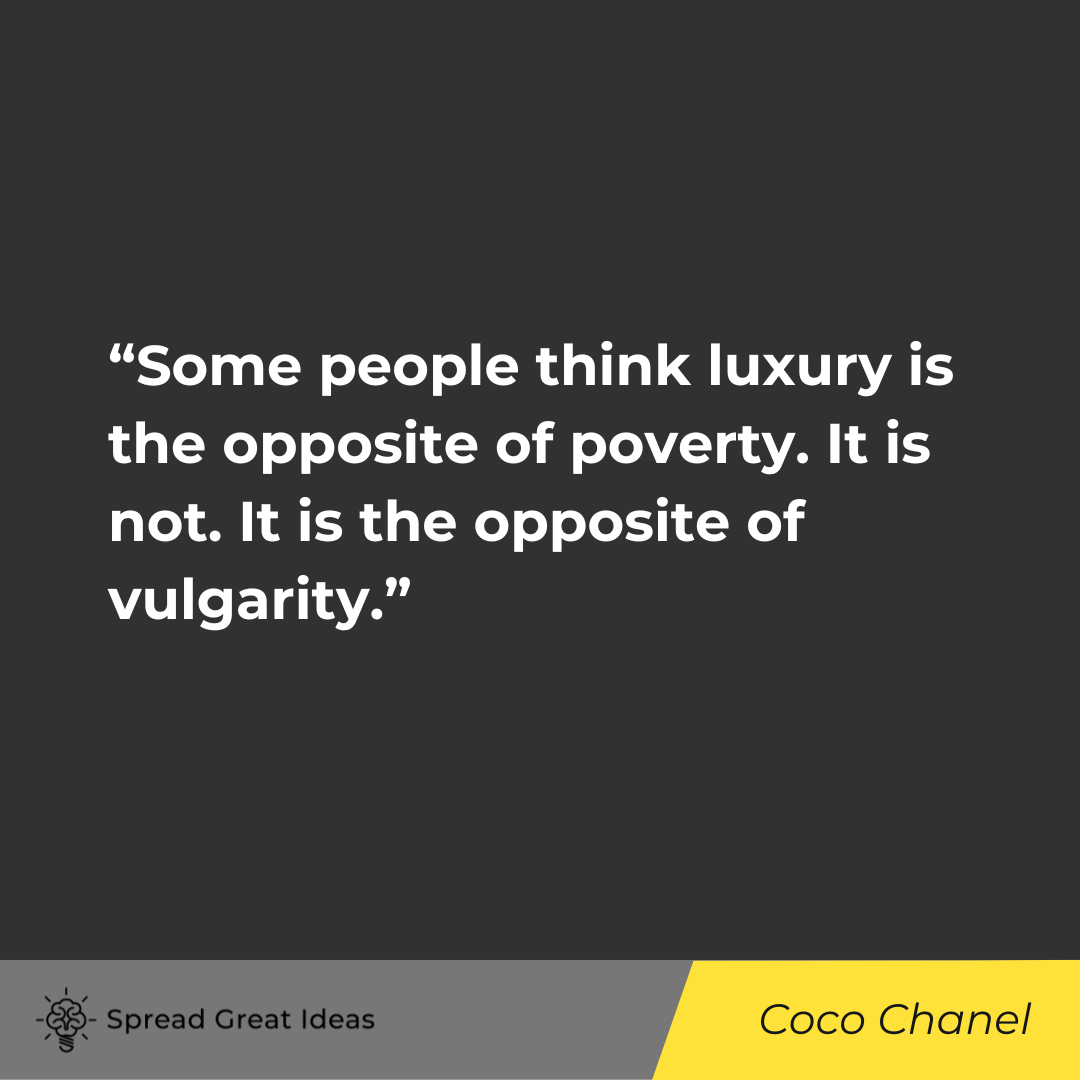
In this quote, Coco Chanel challenges the common perception of luxury as merely the antithesis of poverty. Instead, she suggests that true luxury lies in refinement and elegance, contrasting it with vulgarity. Chanel implies that while wealth may afford material comforts, it is the sophistication and tastefulness in one’s lifestyle and choices that define genuine luxury.
C.S. Lewis
“Pride gets no pleasure out of having something, only out of having more of it than the next man. We say people are proud of being rich, or clever, or good-looking, but they are not. They are proud of being richer, or cleverer, or better-looking than others.”
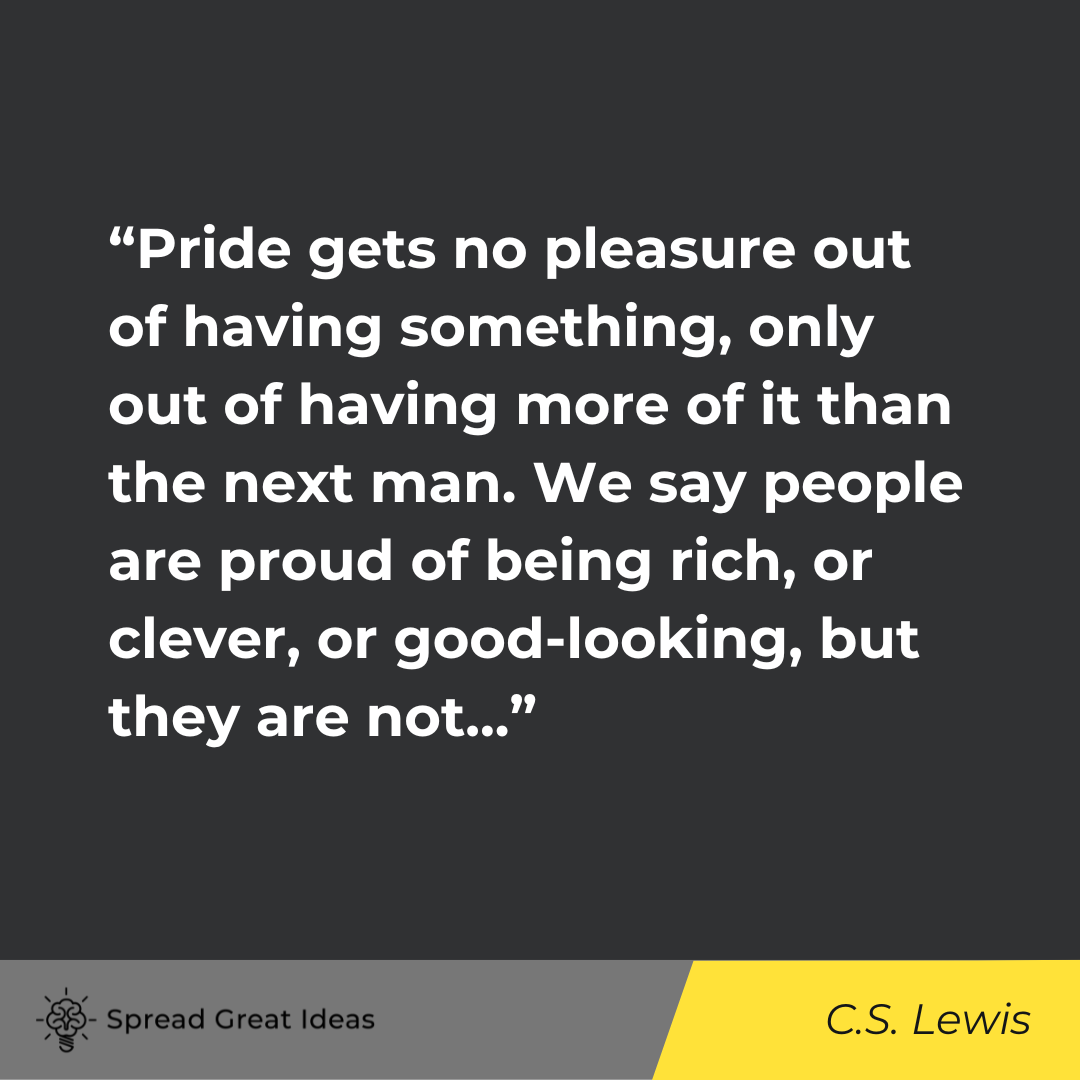
In this quote, C.S. Lewis explores the nature of pride, emphasizing its comparative aspect. He suggests that pride isn’t derived from possessing something inherently valuable but rather from surpassing others in possessions, abilities, or attributes. Lewis highlights how pride is fueled by a sense of superiority over others rather than genuine contentment with one’s own qualities or possessions.
Sam Adams
“If ye love wealth better than liberty, the tranquility of servitude better than the animating contest of freedom, go home from us in peace. We ask not your counsels or your arms. Crouch down and lick the hands which feed you. May your chains set lightly upon you, and may posterity forget that you were our countrymen.”
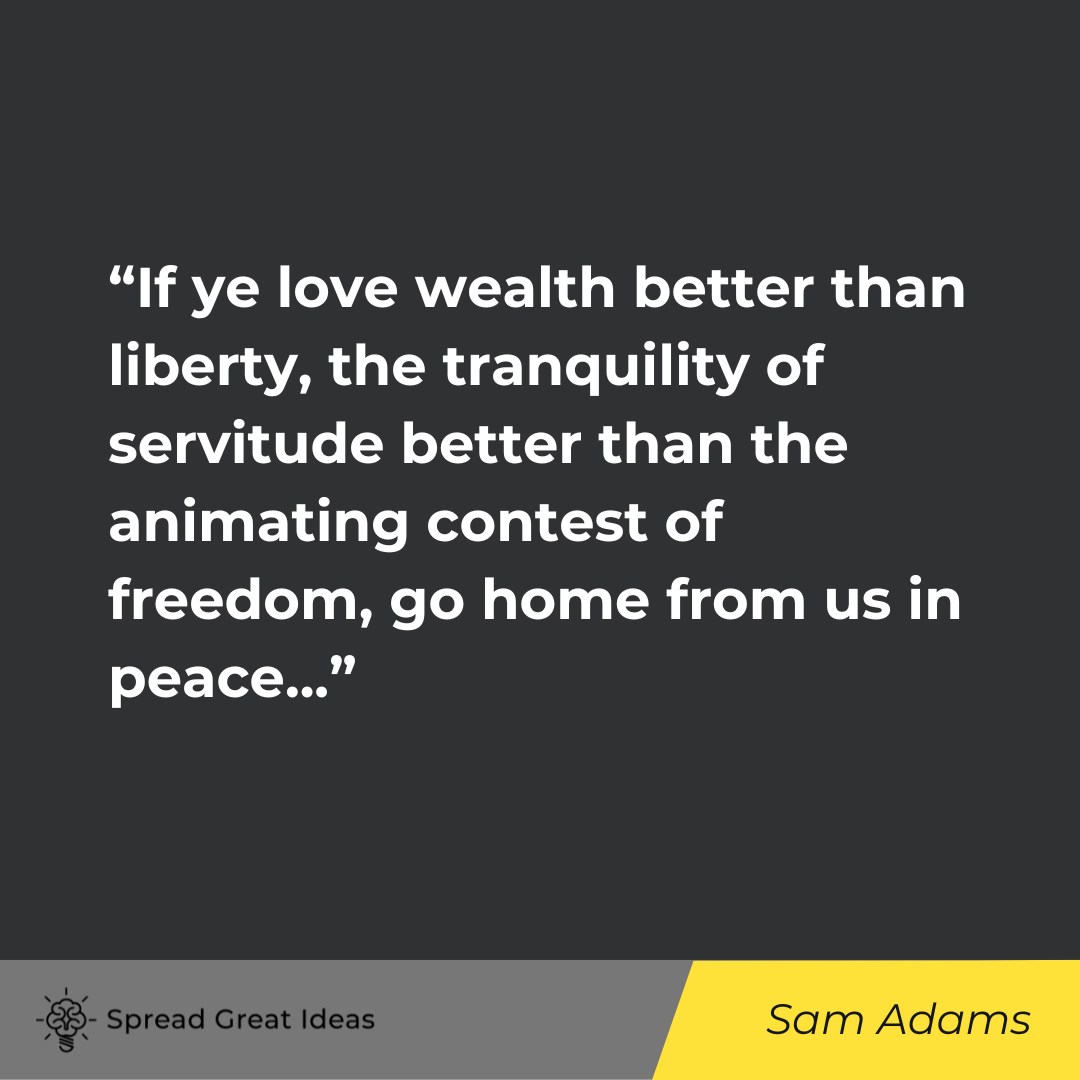
In this powerful quote attributed to Sam Adams, the speaker emphasizes the primacy of liberty over wealth and the willingness to endure the struggles of freedom rather than the comfort of servitude. It underscores the importance of valuing freedom and independence over material gain and warns those who prioritize wealth and servitude to depart from the company of those who cherish liberty. The quote serves as a reminder of the sacrifices made by those who fought for freedom and the responsibility to uphold the principles of liberty for future generations.
Edmund Burke
“If we command our wealth, we shall be rich and free. If our wealth commands us, we are poor indeed.”
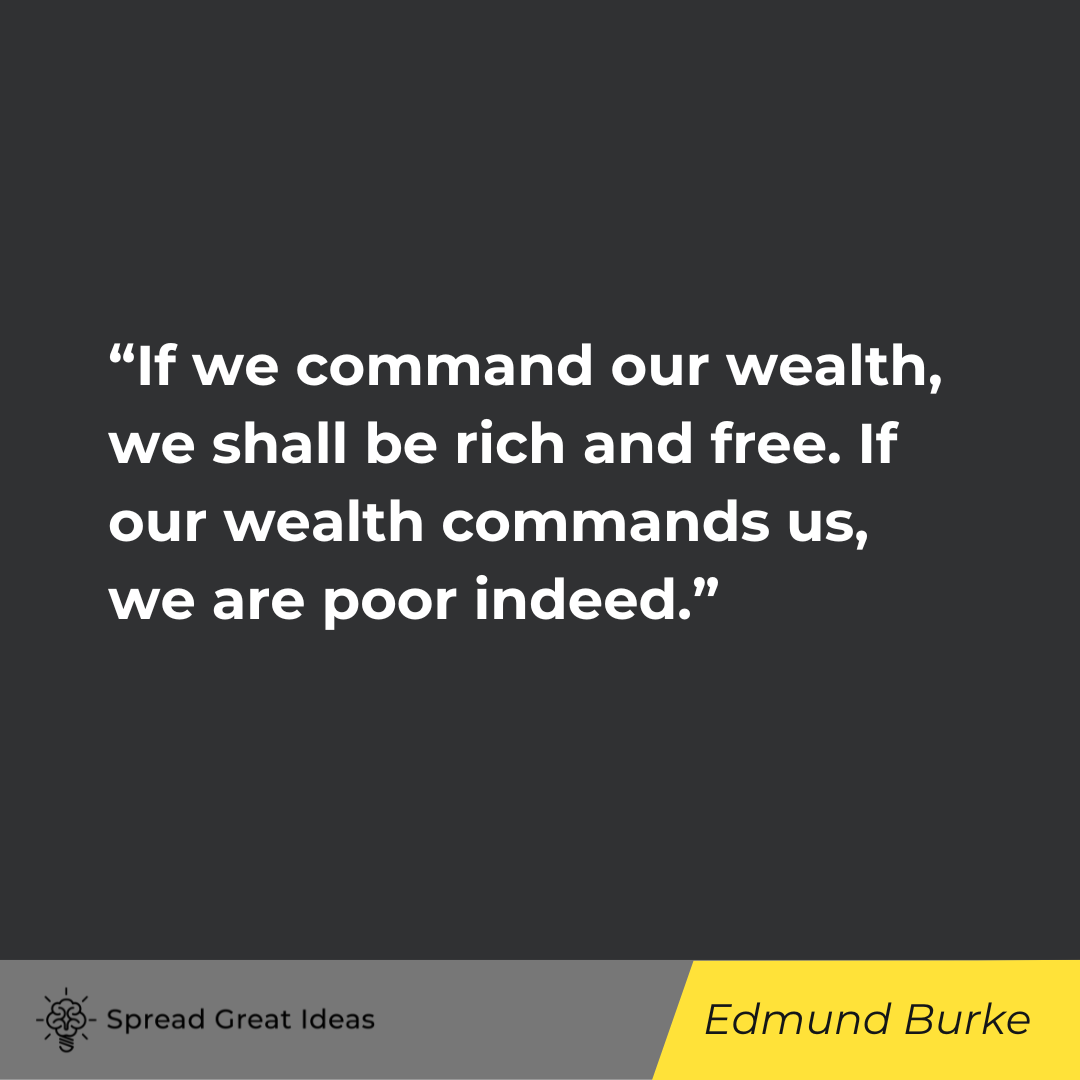
In this quote by Edmund Burke, the speaker highlights the distinction between commanding wealth and being commanded by it. By asserting control over one’s wealth, individuals attain both richness and freedom. However, if wealth exerts control over individuals, dictating their actions and decisions, they are impoverished in terms of true autonomy and liberty. The quote underscores the importance of mastering one’s financial resources to achieve genuine prosperity and independence.
Pablo Picasso
“I’d like to live as a poor man with lots of money.”

Pablo Picasso’s quote encapsulates a paradoxical desire to maintain the simplicity and freedom associated with a modest lifestyle while enjoying the financial security afforded by wealth. It reflects Picasso’s inclination towards prioritizing personal fulfillment and creative freedom over material possessions. The quote suggests a yearning for the unburdened mindset of a person unencumbered by wealth, despite possessing ample financial resources.
George Bernard Shaw
“The surest way to ruin a man who doesn’t know how to handle money is to give him some.”
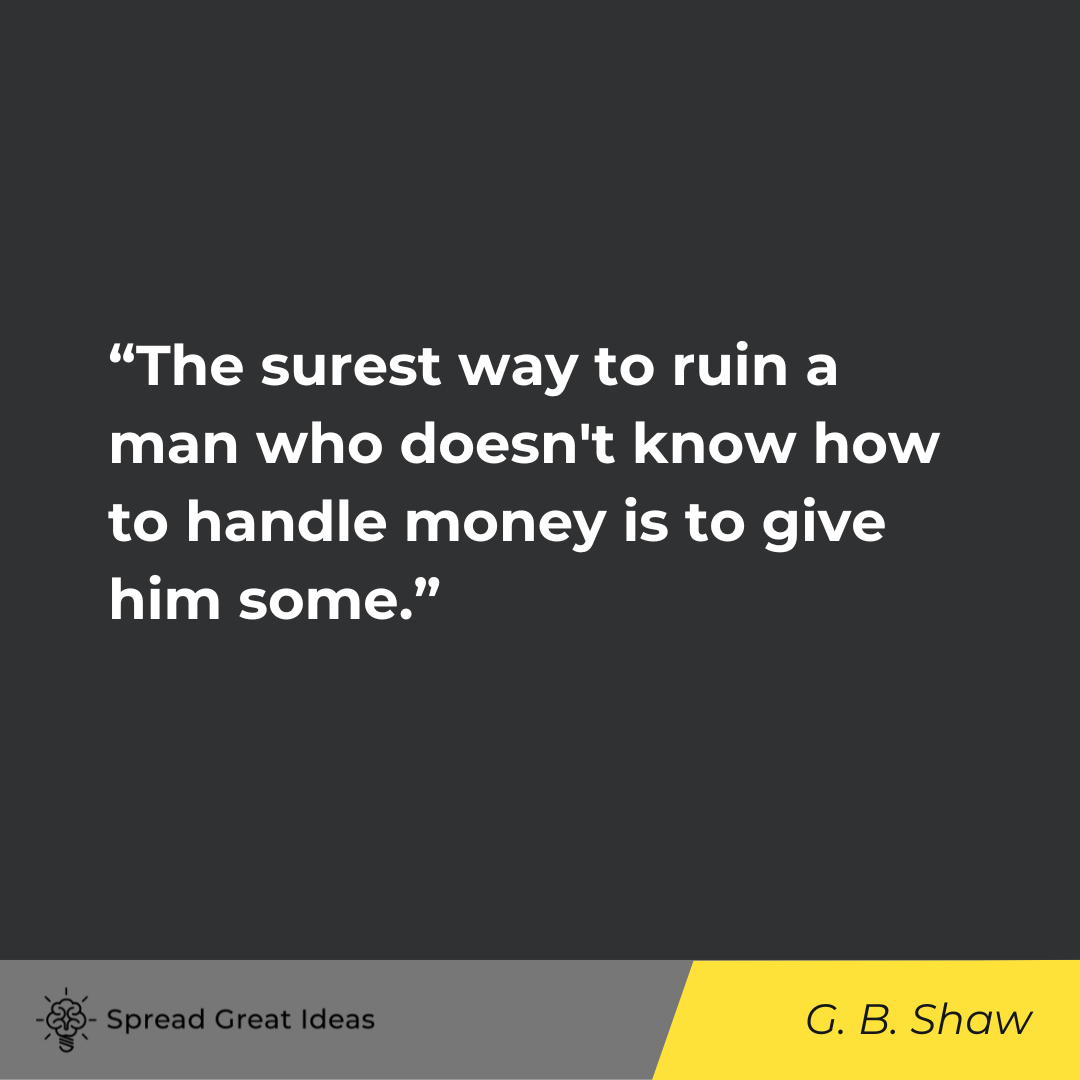
George Bernard Shaw’s quote highlights the idea that financial irresponsibility can lead to ruin, especially when individuals lack the necessary skills to manage money effectively. By suggesting that giving money to someone who lacks financial acumen is a recipe for disaster, Shaw emphasizes the importance of financial education and prudent decision-making when it comes to wealth management.
Ayn Rand
“So you think money is the root of all evil? Have you ever asked what is the root of money? Money is a tool of exchange, which can’t exist unless there are goods produced and men able to produce them. Money is the material shape of the principle that men who wish to deal with one another must deal by trade and give value for value. Money is not the tool of the moochers, who claim you product by tears, or of looters, who can take it from you by force. Money is made possible only by the men who produce. Is this what you consider evil?”
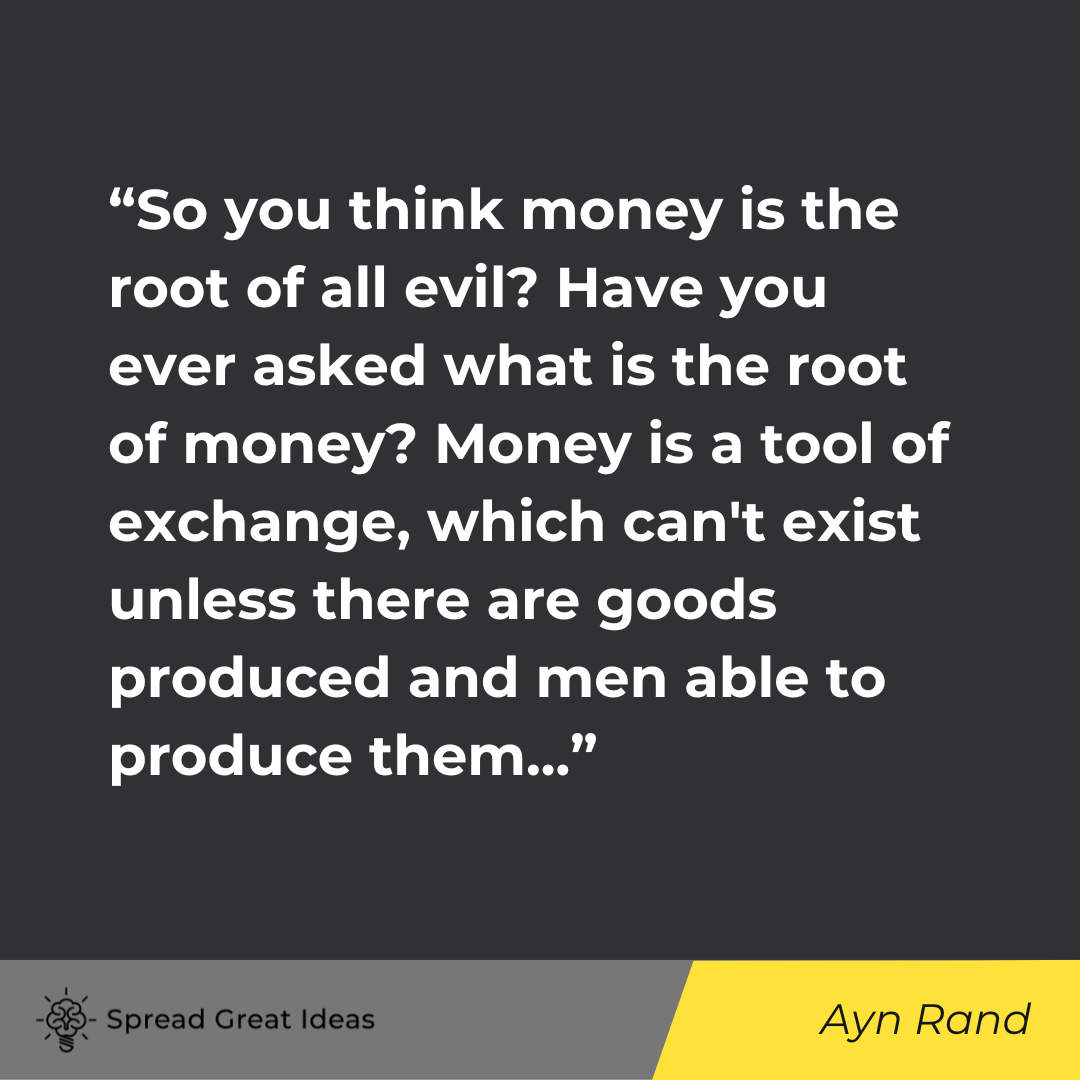
In this quote from Ayn Rand’s “Atlas Shrugged,” the speaker challenges the notion that money itself is inherently evil. Instead, they argue that money is a neutral tool of exchange that represents the value produced by individuals who engage in trade and create goods. The quote criticizes those who seek to obtain wealth through coercion or exploitation, asserting that true wealth is generated through productive work and voluntary exchange.
Seneca
“Wealth is the slave of a wise man. The master of a fool.”
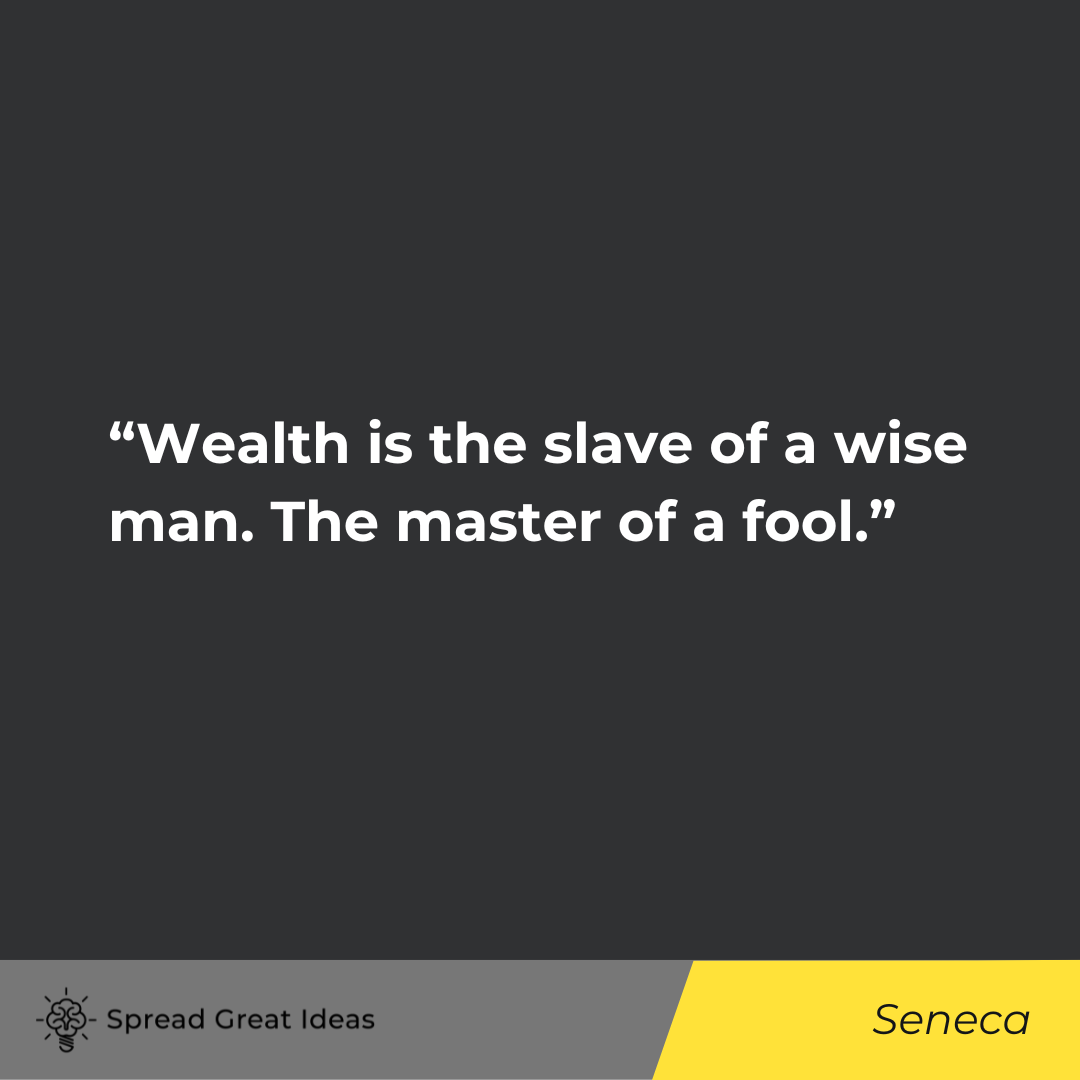
In this quote attributed to Seneca, wealth is depicted as a servant under the control of a wise individual but becoming the master of a foolish one. It suggests that one’s relationship with wealth depends on their wisdom or lack thereof. A wise person can use wealth for their benefit, while a foolish person becomes enslaved or controlled by it. Thus, the quote highlights the importance of wisdom in managing wealth effectively.
G.K. Chesterton
“Among the rich you will never find a really generous man even by accident. They may give their money away, but they will never give themselves away; they are egotistic, secretive, dry as old bones. To be smart enough to get all that money you must be dull enough to want it.”
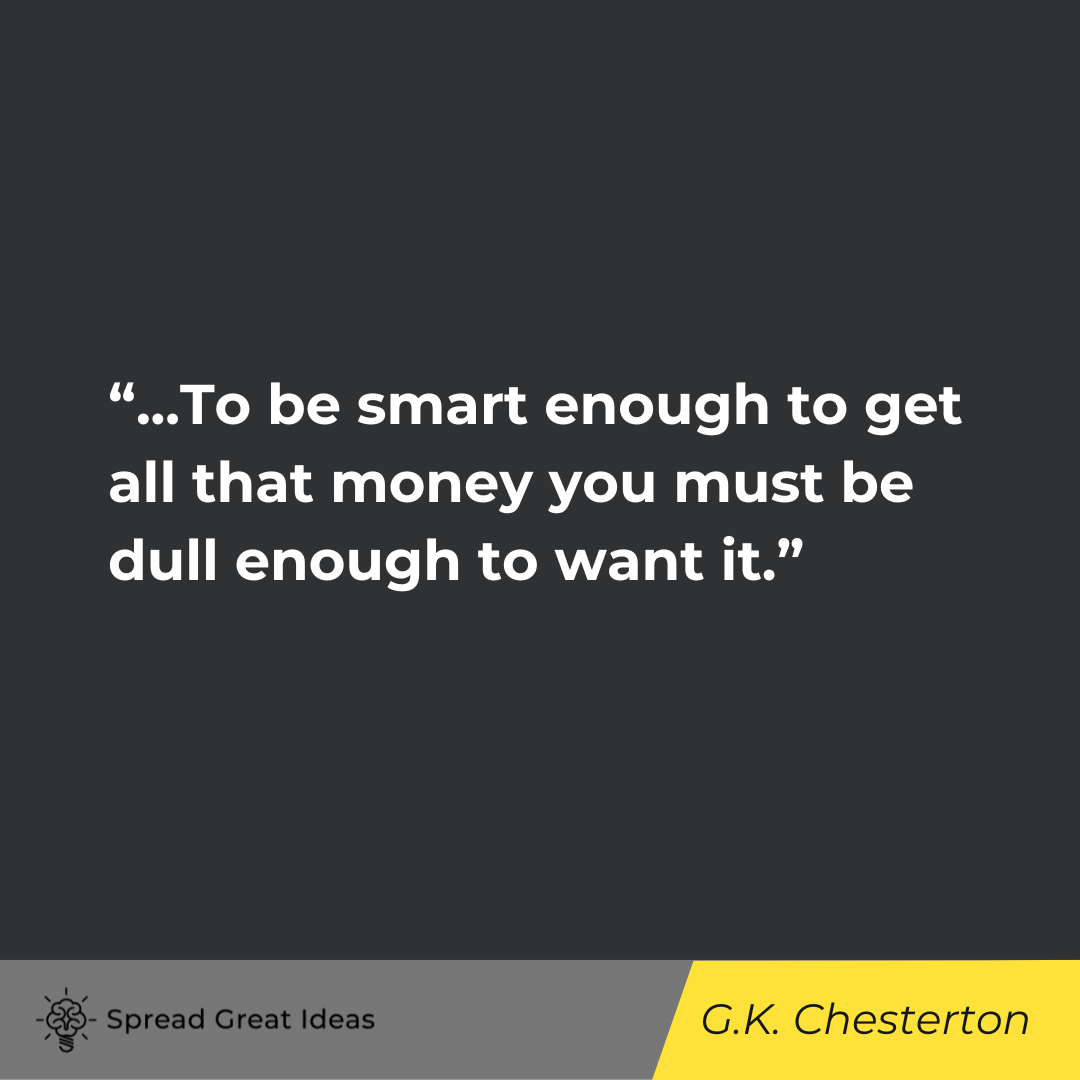
In this quote by G.K. Chesterton, the notion that the wealthy are often lacking in true generosity is explored. Chesterton suggests that the pursuit and accumulation of wealth require a certain level of dullness or narrow-mindedness. He implies that while the rich may part with their money, they are reluctant to share themselves or their true character, exhibiting traits like egoism and secrecy. This statement challenges the commonly held belief that financial wealth inherently leads to generosity and altruism, highlighting the complexities of human nature and wealth acquisition.
William Gibson
“And, for an instant, she stared directly into those soft blue eyes and knew, with an instinctive mammalian certainty, that the exceedingly rich were no longer even remotely human.”
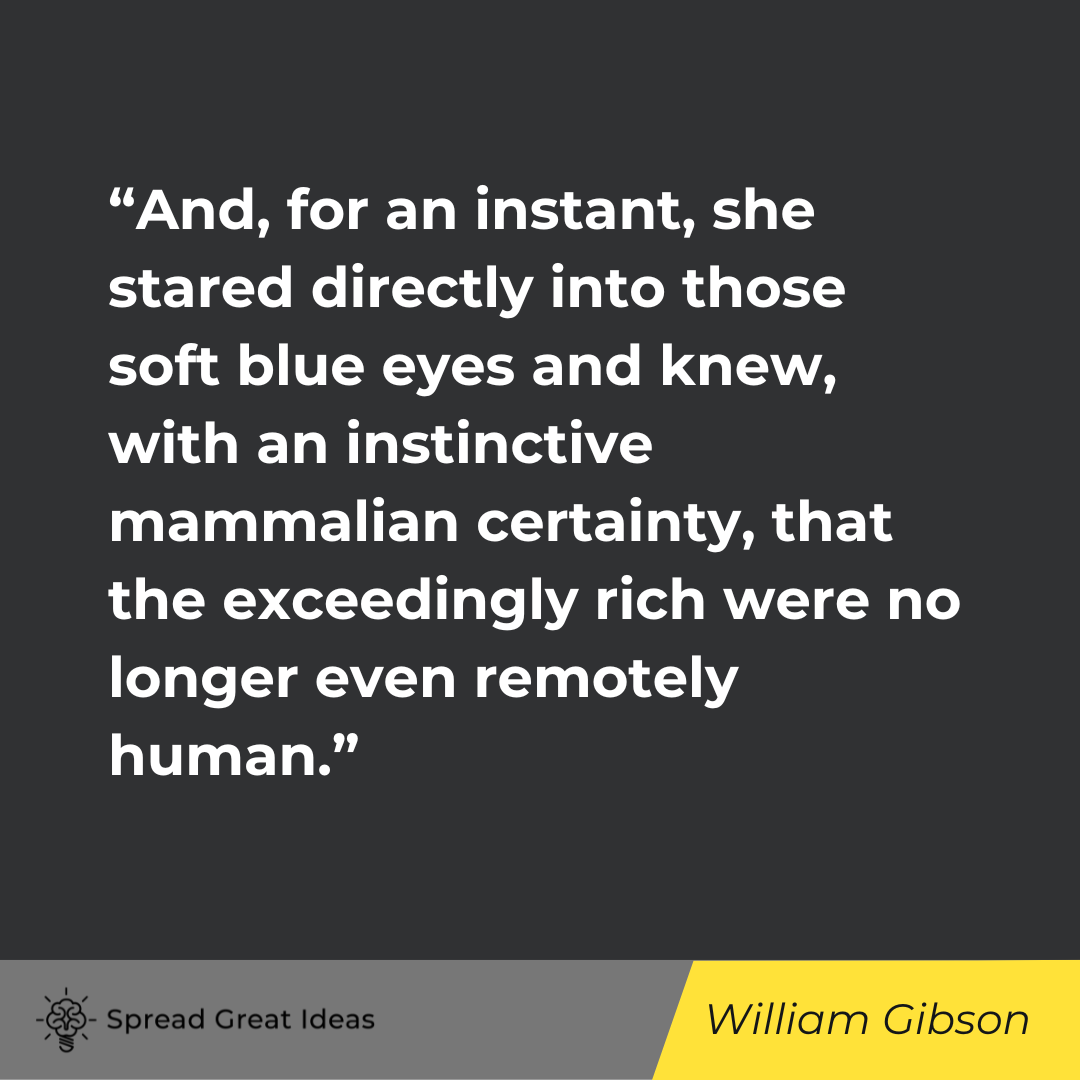
In this quote from William Gibson’s “Count Zero,” the protagonist experiences a moment of clarity when encountering someone of immense wealth. The description captures a sense of detachment and dehumanization associated with extreme affluence. Through the protagonist’s gaze, the reader is invited to contemplate the alienation and disconnect that can arise between the ultra-wealthy and the rest of society, emphasizing the societal divides perpetuated by wealth inequality.
Marcus Aurelius
“Receive [wealth or prosperity] without arrogance; and be ready to let it go.”
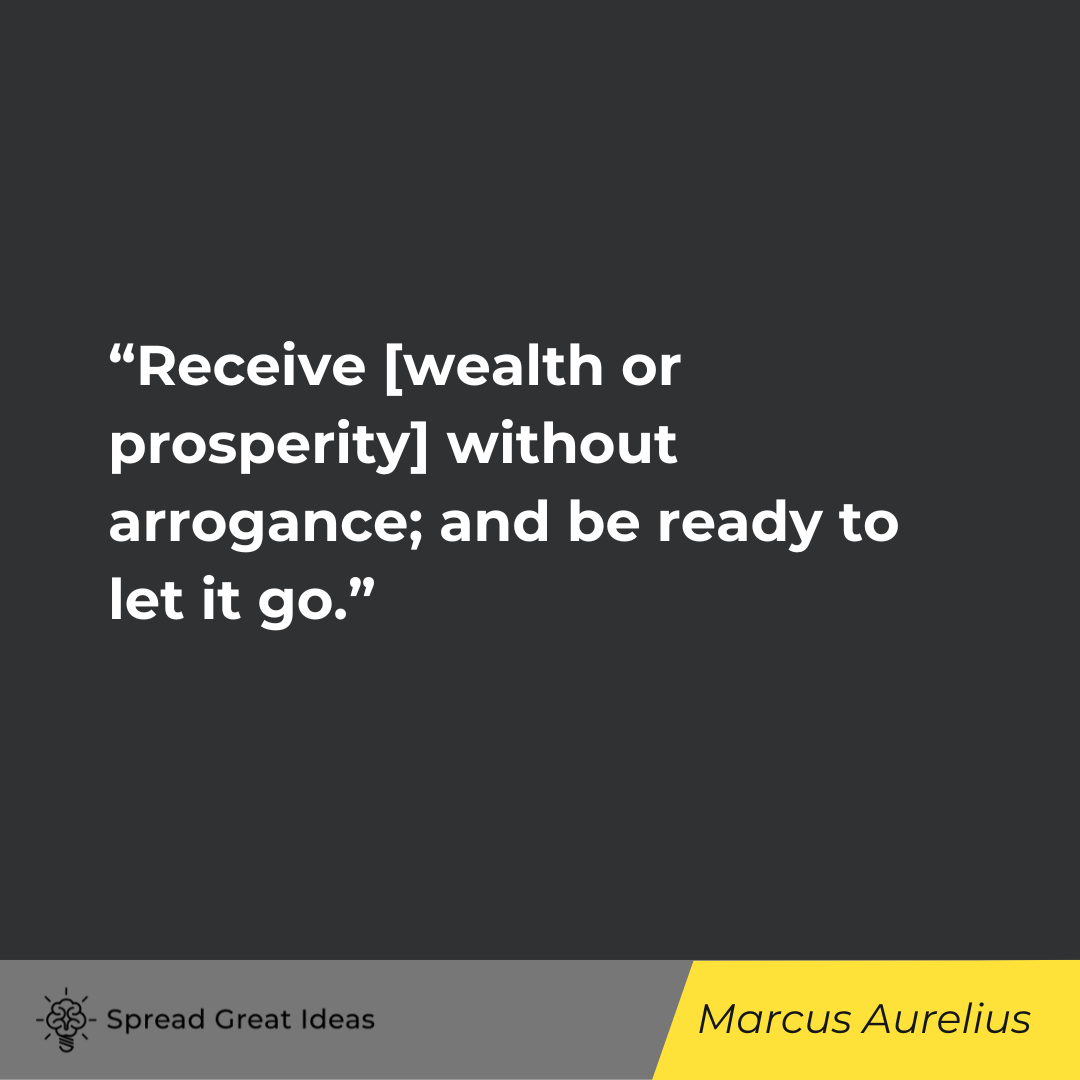
In this quote from Marcus Aurelius, the Roman Emperor and Stoic philosopher, he advises on the virtue of humility and detachment regarding wealth or prosperity. He encourages individuals to accept prosperity graciously without becoming arrogant or attached to it, emphasizing the Stoic principle of maintaining inner tranquility regardless of external circumstances. Additionally, he underscores the importance of being prepared to let go of wealth when necessary, advocating for a mindset of non-attachment and resilience in the face of material possessions.
Richard Wagner
“Joy is not in things; it is in us.”
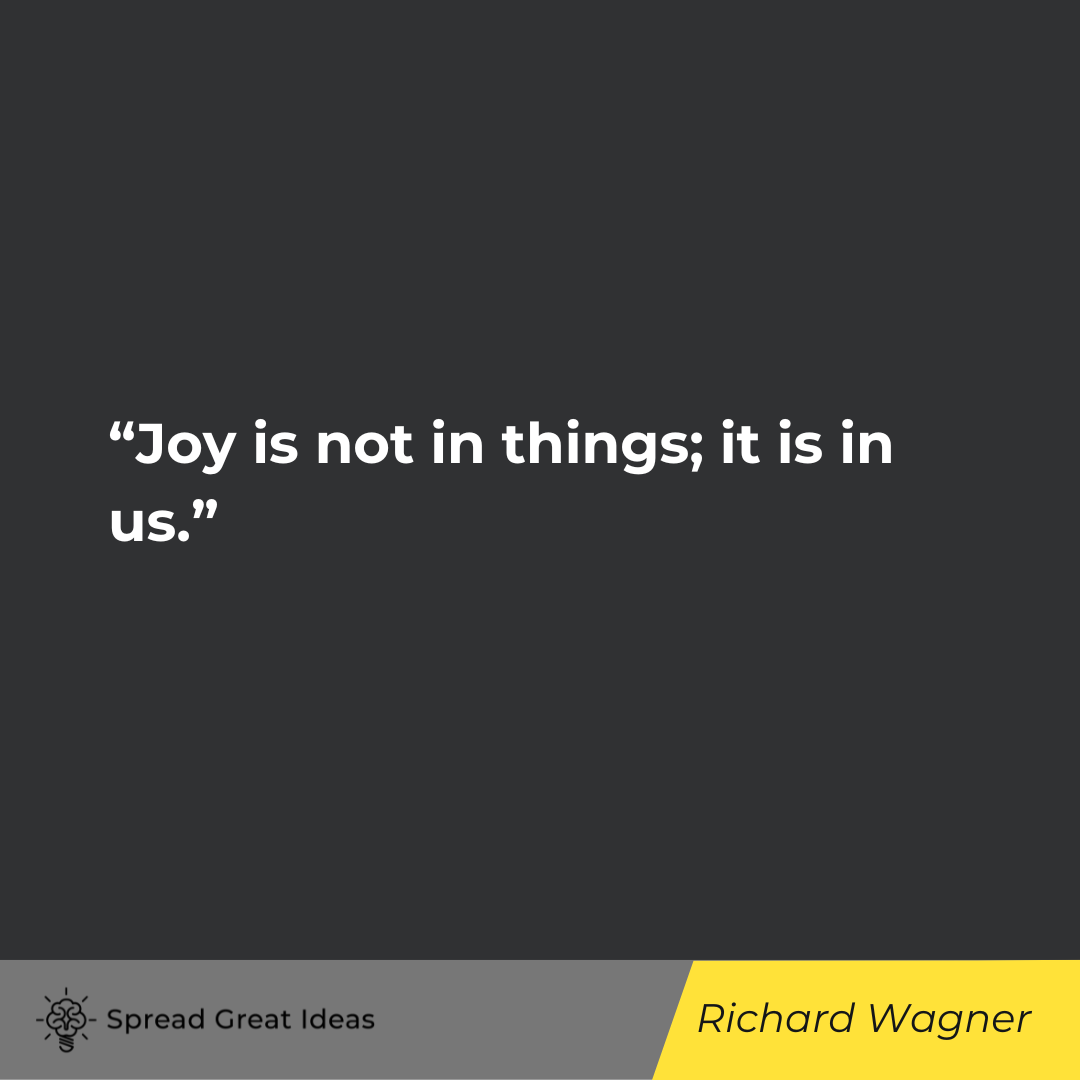
Richard Wagner, a renowned composer, reflects on the nature of joy in this quote, suggesting that it is not derived from external possessions or circumstances but rather from within ourselves. He implies that true happiness and contentment come from our inner state of being, rather than from material wealth or external factors. By emphasizing the intrinsic nature of joy, Wagner highlights the importance of cultivating inner peace and fulfillment as the key to experiencing true happiness in life.
